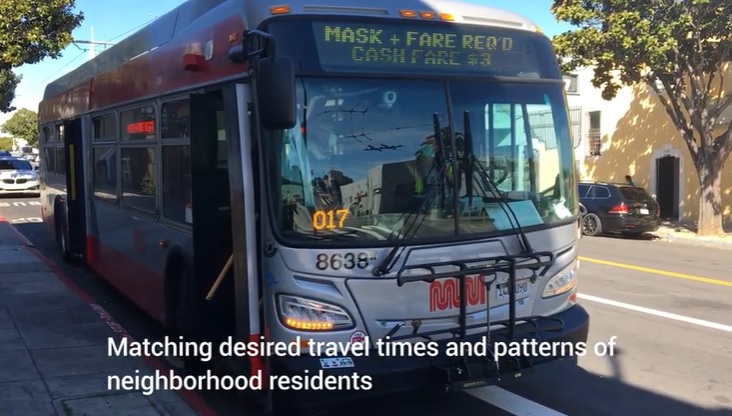Growing India News, world news, nation news, our news, people's news, grow news, entertainment, fashion, movies, tech, automobile and many more..
Wednesday, March 31, 2021
Show HN: Signed Work – NFTs, without a blockchain https://ift.tt/3u6uNOb
Show HN: Jamstack deployment providers performance benchmark https://ift.tt/3weJG2C
Show HN: Find people to play tabletop roleplaying games with https://ift.tt/3wpzsNc
Show HN: Make gratitude a daily habit with Three Things Daily https://ift.tt/2PqiGg1
Show HN: Learn to rebuild product hunt's #1 products with no-code https://ift.tt/39toFHH
Show HN: NFTPedia – search and find info on NFTs https://ift.tt/3rxlqoR
Show HN: Remote Choice – Discover where to live and work from remotely https://ift.tt/3fwQnXZ
Show HN: Imperium, a free and minimalist file manager https://ift.tt/3frCbzn
Tuesday, March 30, 2021
Muni’s Equity Toolkit Helps Essential Employees Get to Work
By Mariana Maguire
The latest data from SFMTA’s new Equity Toolkit shows that Muni service changes are helping people in neighborhoods identified by our Muni Service Equity Strategy access more jobs and support the city’s recovery.
In winter 2020, we launched the SFMTA Equity Toolkit to understand how service decisions are affecting neighborhoods where there is likely a high prevalence of essential workers who rely predominantly on Muni to get to their essential jobs. Our goal is to make better service decisions based on the trends and impacts we see in the Equity Toolkit.
Recently, the greatest increases in access to jobs via Muni have been in Hunters Point and Western Addition. The Hunters Point neighborhood saw the largest gains from the addition of the 15 Bayview-Hunters Point Express, as demonstrated in the table below. Thanks to the return of key Muni lines and increased frequencies on connector routes, Inner Mission, Tenderloin, Oceanview-Ingleside and Treasure Island have also seen increased access to jobs via Muni.
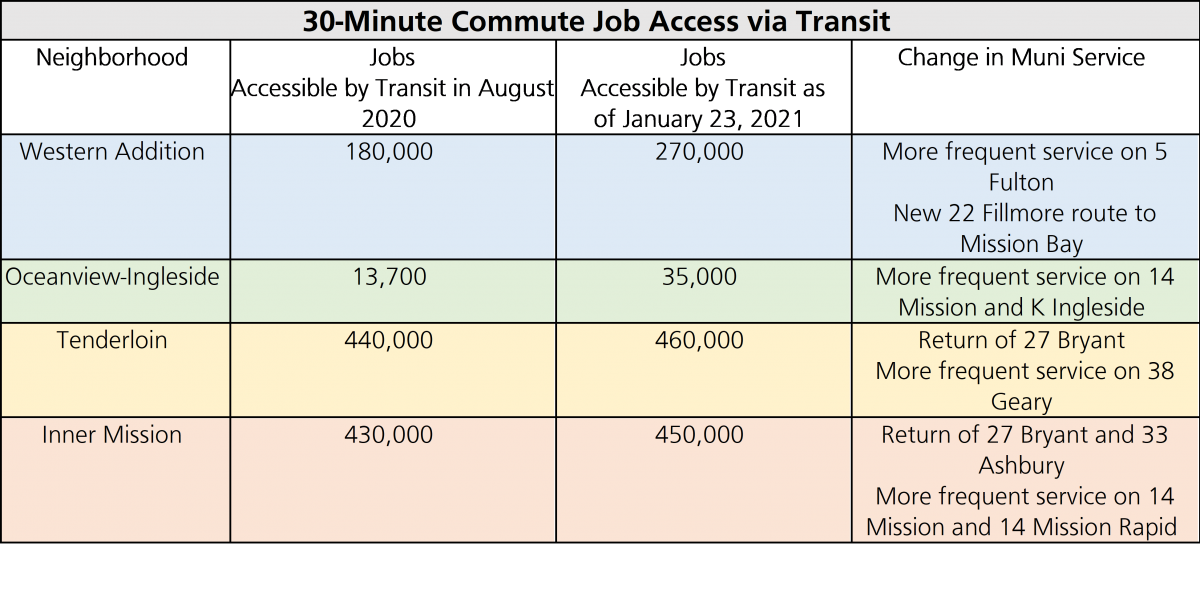

Lessons Learned
The Equity Toolkit also shows some decreases in job access via transit in other neighborhoods identified by the Muni Service Equity Strategy. This reflects the Toolkit’s methodology and/or the impacts of service changes and helps us to understand where we need to make improvements in our data collection, transit service or both.
Bayview job access increased for commutes of 45 and 60-minutes, but decreased 11% for 30-minute commutes. How can that be? The answer is that the T Third bus substitution was replaced with rail service in December 2020, which makes different and fewer stops than the bus within a 30-minute time period. Overall, Bayview residents are still able to access more jobs now than in August 2020 – roughly 644,500 now compared to 624,000 then, a 3% increase.
In addition, we rely on fixed points of reference, such as the Bayview Opera House, to gather data and Bayview is a large neighborhood. We learned that using one community landmark for this area is not enough, so we will be adding additional landmarks in future analyses to more accurately capture service change impacts.
In Visitacion Valley we see decreases in job access via transit across the board. Like in the Bayview, we determined that the issue is both methodology and service. When we redistributed buses from the 8 Bayshore to 8AX to respond to changes in ridership, the community landmark (John King Senior Community) we were using to track the data only showed us the decrease from the 8 Bayshore, not the increase from the 8AX.
By comparison, more affluent areas show very low to no increases in job access via transit. This reflects our decision to prioritize resources on Muni service for essential workers and essential travel, especially for communities with the fewest options during this unprecedented pandemic. More affluent neighborhoods have more transportation alternatives readily available and more people who are able to work from home.
These findings give us insights we didn’t have before and help us think about service in new ways. As we learn from the Equity Toolkit we will continue to refine it and make it more detailed by adding more reference points for our data analysis.
As San Francisco gradually reopens and we continue to add back Muni service, we will also continue to evaluate the impacts through our Equity Toolkit and work to use these insights to inform service adjustments that support our city’s economic recovery.
Read more about changes to our network on the SFMTA’s Transportation Recovery Plan webpage.
Published March 30, 2021 at 11:03PM
https://ift.tt/2PkupwH
Show HN: Sleekplan – Feedback Board, Roadmap, and Changelog for Websites https://ift.tt/3wd2Jus
Show HN: Collect and View Data from SEC 13F Filings https://ift.tt/3cF4b0Z
Show HN: Build Autonomous Economically-focused Agents using the AEA framework https://ift.tt/3ruO2ze
Show HN: Yazz Visual JavaScript Now on the Mac App Store https://ift.tt/2PiVHDG
Show HN: Play with Shaders Inspired by Slime Mold https://ift.tt/3wdv2c8
Show HN: Writing a simple, event-driven, extensible, rich text editor framework https://ift.tt/3wbEaOp
Show HN: Poulette – A Color Palette GUI https://ift.tt/3dhWKf8
Show HN: Statsig – feature gates, dynamic config, experiments and more for devs https://ift.tt/39pGGqG
SFMTA’s Cable Car Signal Tower Gets a Refresh
By Jeremy Menzies
At the corner of California and Powell Streets stands a diminutive but important building that has been in use for well over 100 years. This octagonal signal tower controls the crossing of the Powell and California Street cable car lines, and recently underwent a full restoration thanks to the skilled craftspeople at the Cable Car Division.
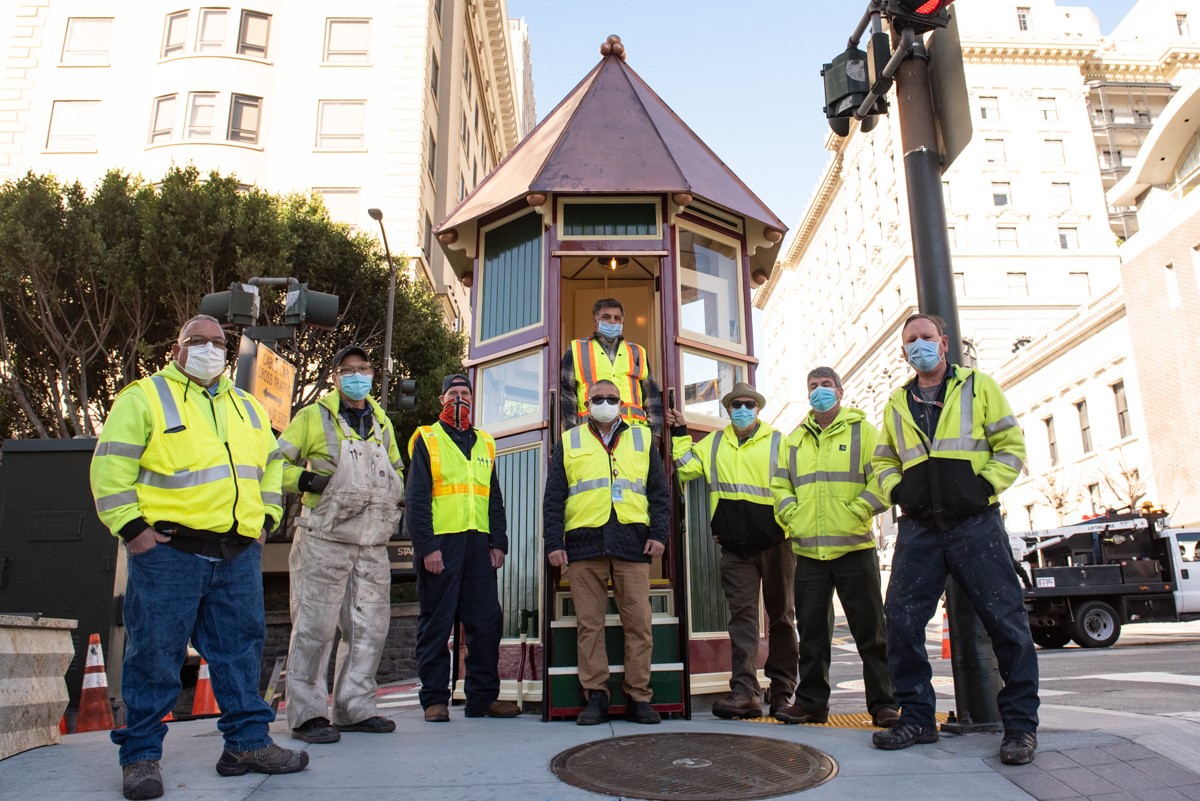
A group photo of Muni craftspeople and shop management who worked to restore the signal tower in 2020-2021.
The tower’s history dates to 1888 when the original was built by the Ferries and Cliff House Railroad, which operated cable cars on Powell Street at the time. That tower was destroyed in the 1906 earthquake and fires that ravaged Nob Hill. In March 1907, it was rebuilt by then-owner United Railroads of San Francisco (URR) and went back into operation.
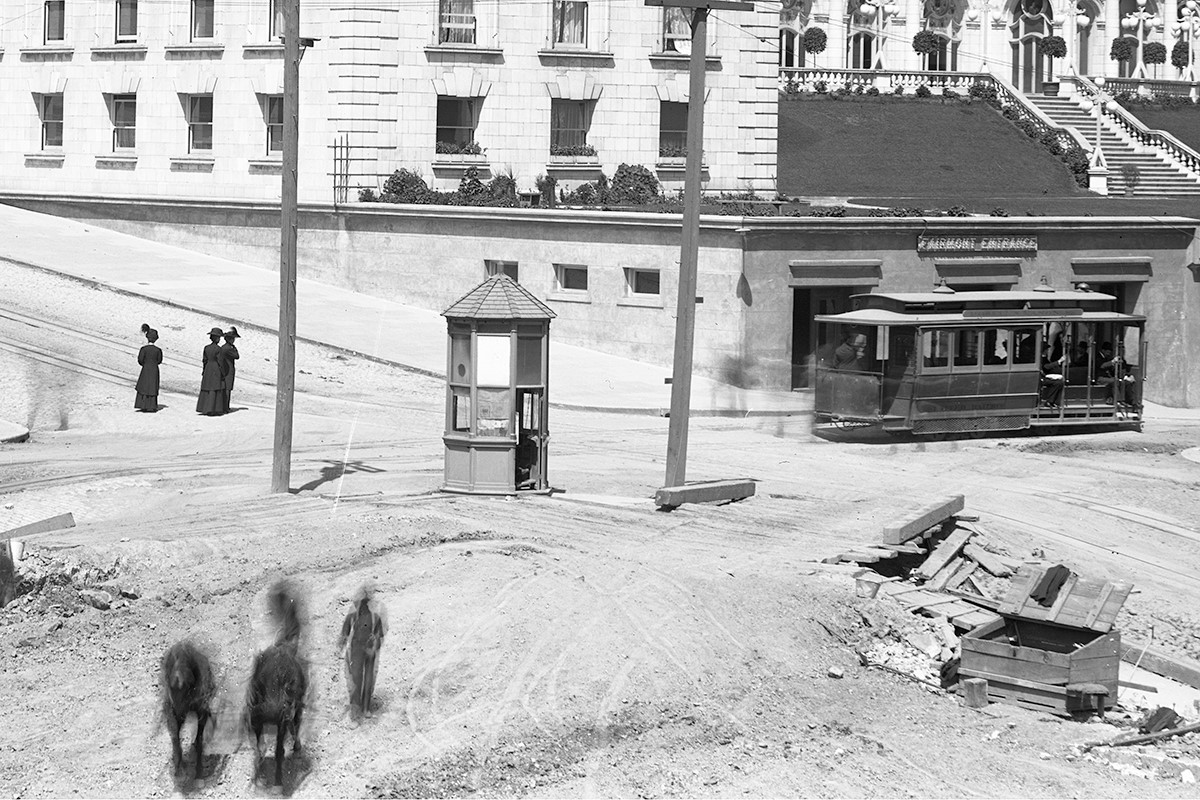
Photo showing signal tower in 1908 with the Fairmont Hotel and passengers waiting for a cable car in the background. Photo courtesy OpenSFHistory.org.
In 1935, a runaway automobile on California Street struck the tower, causing severe damage and tragically killing the signal operator inside. The tower was subsequently rebuilt, and a heavy metal barrier was installed on its west side.
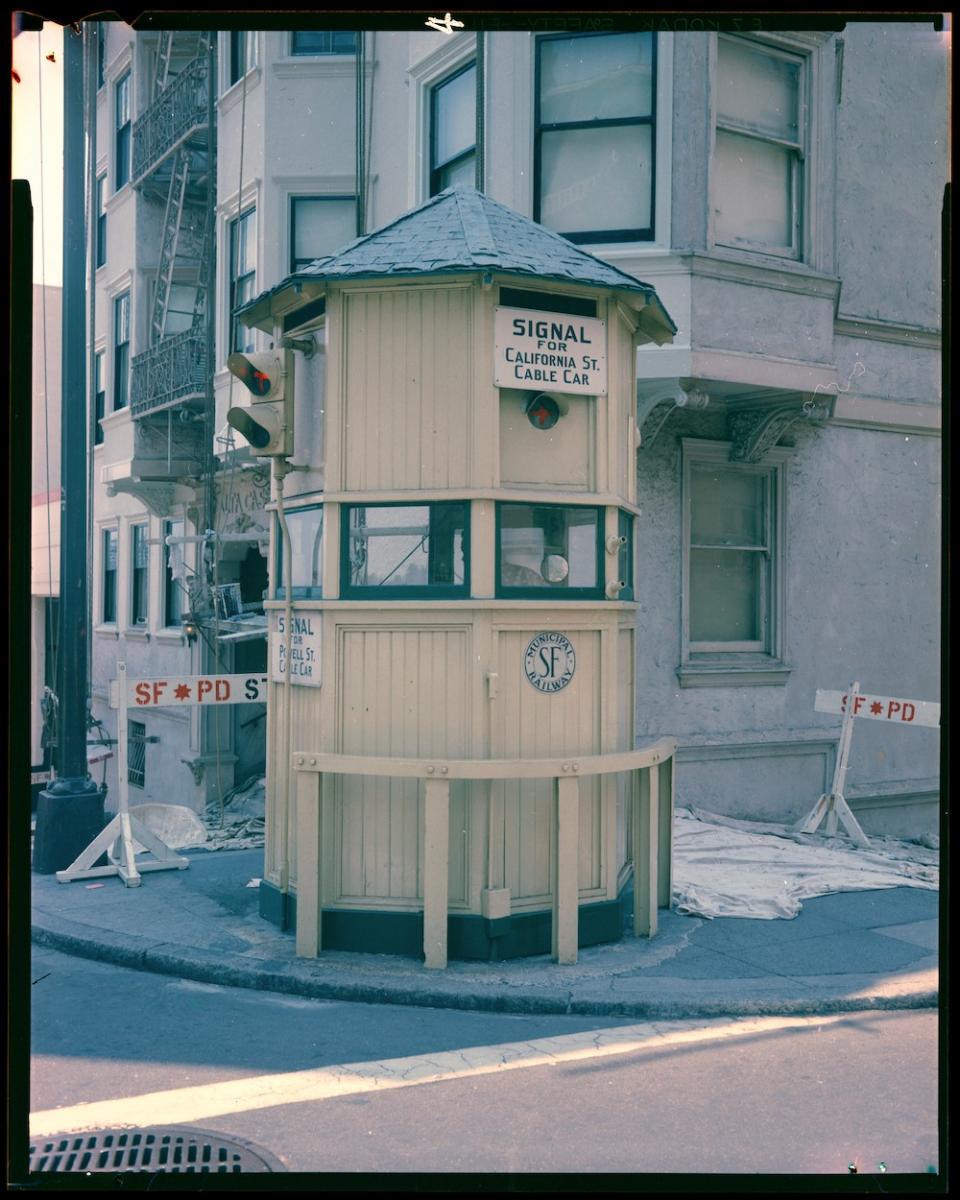
This 1966 photo shows the west-facing side of the tower, painted in green and cream, shortly before paint and repairs were done on the building.
The next major change came in 1967 when the tower was renovated and a new copper roof was installed. The structure was also repainted to reflect the maroon and tan color scheme of the California Street cable cars. Until 1982, the tower retained its manually-operated kerosene lantern signals originally installed in 1907.
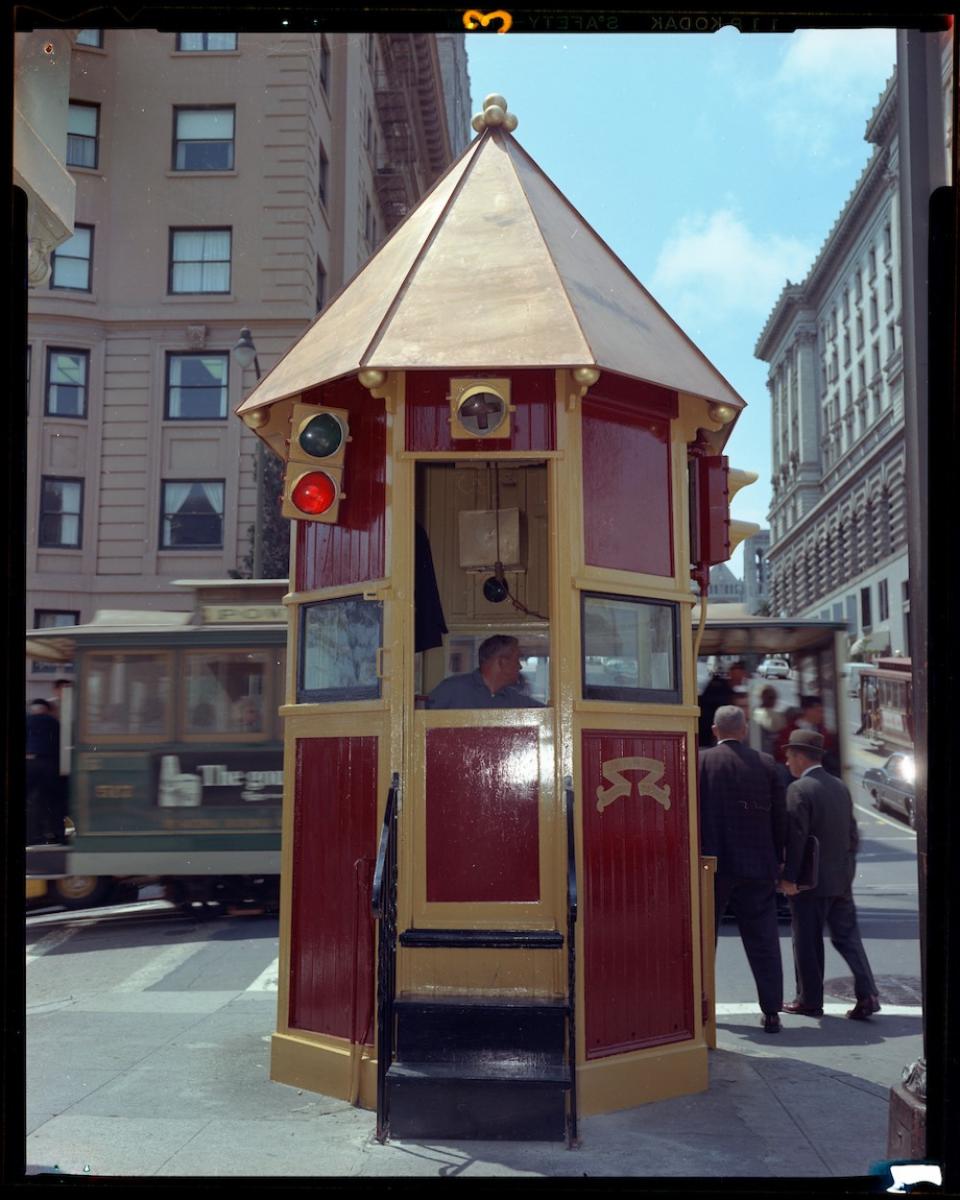
A 1967 photo showing the newly repainted and copper-roofed signal tower.
The suspension of cable car service during the Covid-19 pandemic proved an opportune time to give the little signal tower some much needed T-L-C. During 2020 and early 2021, SFMTA carpenters, painters, metal workers and mechanics undertook a complete overhaul of the building. A new floor, roof, ceiling, door, windows, steps, heating, lighting and electrical system were all built and installed.
As with our world-renowned cable cars, no detail was overlooked during the tower rebuild. Muni carpenters repaired woodwork throughout, custom-building both the octagonal ceiling and split Dutch door. Paint crews highlighted each element of the tower with colors that enhance the structure’s overall visual appeal. Our expert mechanics installed new electrical systems. Even the grab handles and handrails for the steps were custom built from materials that are also used on Powell Street cable cars by skilled metalworkers at the SFMTA’s Special Machine Shop. A final step in this rebuild will be the installation of new signals before the tower goes back into operation later this year.
Check out the gallery below showing photos of the tower through the years and the recent restoration.
Published March 30, 2021 at 02:40AM
https://ift.tt/3m39I4d
Show HN: 8bit live chat with Papercups and NES.css https://ift.tt/3wbRceQ
Show HN: Unlimited app designs, user stories, and landing pages https://ift.tt/3sxS1fO
Show HN: Beehive – Talk 1:1 About Anything https://ift.tt/39pAij2
Show HN: Canopy – API first loan servicing infrastructure https://ift.tt/2QGvEqg
Monday, March 29, 2021
Show HN: An open-source, self-hostable Heroku and Netlify alternative https://ift.tt/3szUA0S
Show HN: I wrote a program to convert lines of text into trees https://ift.tt/3ryfwnt
Show HN: WebRTC-Echoes: Interop for C#, C++, Python, TypeScript, Go and Servers https://ift.tt/31vbBNG
Show HN: Nettu Scheduler – A self-hosted calendar and scheduler server https://ift.tt/2QCU5ov
Show HN: Mosh Mallet: Single packet UDP port knocking for Mosh without SSH https://ift.tt/39oxD9i
Show HN: An alternative to AlternativeTo (GitHub version) https://ift.tt/2PyfgaR
Show HN: I wrote a program in Zig to solve my friend's riddle https://ift.tt/3sJkdfT
Show HN: Suspend DigitalOcean droplets and 3x your use/cost https://ift.tt/3u0UUpv
Show HN: A Hacker News CLI Reader (MVP) https://ift.tt/3ddvL4h
Sunday, March 28, 2021
Show HN: Webletters – discover and review blogs and newsletters https://ift.tt/3sx73lY
Show HN: useNft() is a React Hook to fetch NFT metadata https://ift.tt/39lXbnE
Show HN: Muboard: Self-Rendering and Distributable Mathematics Chalkboard https://ift.tt/3vZV6XY
Show HN: I rebuilt an API-first chatbot platform from 2015 https://ift.tt/2QHpshL
Show HN: Fooder – a private digital kitchen notebook https://ift.tt/31stJrG
Show HN: A Latin self study course, Khan Academy-style https://ift.tt/2PF72h1
Show HN: Togglee – Feature flags/toggles OS library and SaaS https://ift.tt/3cqNqq2
Show HN: Salary Standoff – Resolve the salary expectation/range stalemate https://ift.tt/3ftcAWK
Show HN: Learned to code during lockdown and built a Rotten Tomatoes for tech https://ift.tt/3rD9uSR
Show HN: Automation tracing coming to Home Assistant https://ift.tt/3rvdggE
Show HN: Useful Linux Search filesystem (Updated with exclusion ability) https://ift.tt/2QOHK0R
Show HN: A cyberpunk theme for Python desktop applications https://ift.tt/3ruEMeu
Saturday, March 27, 2021
Show HN: Simpler Goimports https://ift.tt/2PfMmMK
Show HN: HextEdit – A fast and native hex editor for macOS https://ift.tt/3crpoLy
Show HN: Learn Spanish quickly while reading https://ift.tt/3cqzT1v
Show HN: Stackby – Spreadsheets, Databases and No-code APIs in a single platform https://ift.tt/3dffQlQ
Show HN: Reverse engineered Opera VPN client https://ift.tt/3sxVs64
Show HN: Collaborative Smart Note App https://ift.tt/3dbMg0H
Show HN: Google Forms Alternative https://ift.tt/3w4BGRN
Show HN: How to free the Ever Given https://ift.tt/2Pw5030
Show HN: Device Shots 1.0 – Screenshot Device Mockup Generator https://ift.tt/31nRUHG
Show HN: Send Me a Secret https://ift.tt/3w600CL
Friday, March 26, 2021
Show HN: jCore – JavaScript library for building UI components https://ift.tt/3u3hYEp
Show HN: UpfrontJS https://ift.tt/2NVNiW1
Better Connections from Bayview and Hunters Point to Downtown
By Enrique Aguilar
To better connect southeast San Franciscans with downtown, the SFMTA debuted the 15 Bayview Hunters-Point Express in late January, coinciding with the return of T Third train service. Within weeks, average daily boardings reached 1,000 customers on this new service.
The 15 Bayview Hunters Point Express
We added this route based on community feedback from the Southeast Muni Expansion Project in 2018, which prioritized a more direct trip to downtown from the Bayview. With the sudden rise of the COVID-19 pandemic and its disproportionate impacts on communities in the Bayview and Hunters Point, fast-tracking the project became critical to our transit planning. Adding service capacity and a direct connection between these neighborhoods and downtown is a crucial step in supporting the City’s economic recovery and increasing job access for essential workers using transit.
Using data from the SFMTA Equity Toolkit, staff determined that the addition of the 15 Bayview Hunters Point Express in the January 23 service changes resulted in the largest increase in job access for 45- and 60-minute commutes of any San Francisco neighborhood.
The SFMTA convened the Bayview Hunters-Point Express Working Group, comprised of community leaders who helped shaped the conversation on route options. Then, at a time when pandemic precautions precluded in-person community outreach, we invited all area residents to vote for their preferred route through both an online and text-based survey.
After months of planning and continuous support from the Bayview Hunters-Point Express Working Group, we were able to implement a route that offers service closer to residents’ homes and make trips shorter for community members.
“We appreciate the community process and approach SFMTA took to reinstate the 15 Bayview Hunters Point Express,” said Lyslynn Lacoste, Executive Director at Bayview Hunters Point Mobilization for Adolescent Growth in our Communities (BMAGIC) and working group member. “Particularly identifying and prioritizing those that are most isolated in the Bayview community and ensuring that they have efficient access to the public transportation line extending to downtown. I look forward to personally utilizing [it] myself as I travel from the downtown area to my office in the Bayview.”
While in-person outreach remains limited due to COVID-19 physical distancing guidelines, SFMTA staff continue to engage community residents and leaders in order to evaluate the service and gather feedback. Discussions with the working group on the initial impact of the service began earlier this week. In mid-March, project staff also distributed handouts to customers of the 15 Bayview Hunters Point Express waiting at bus stops and onboard when riding between downtown and the Bayview. Posters were also placed in businesses along Third Street in the Bayview.
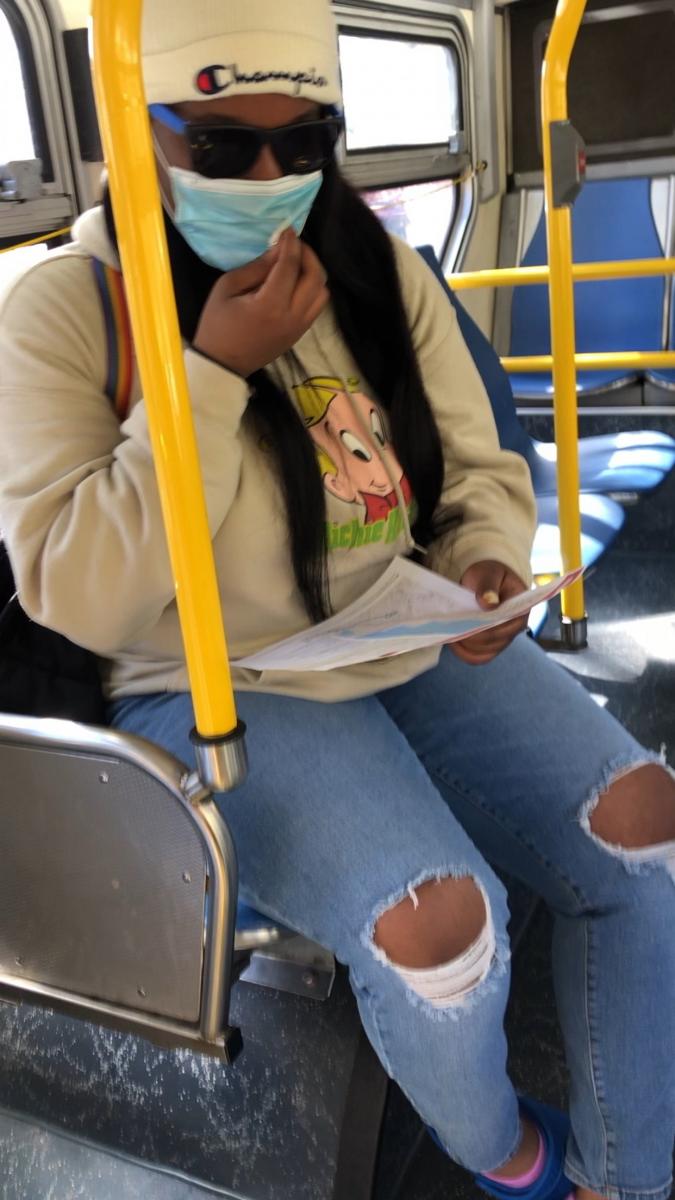
Muni customer reading handout provided by SFMTA staff
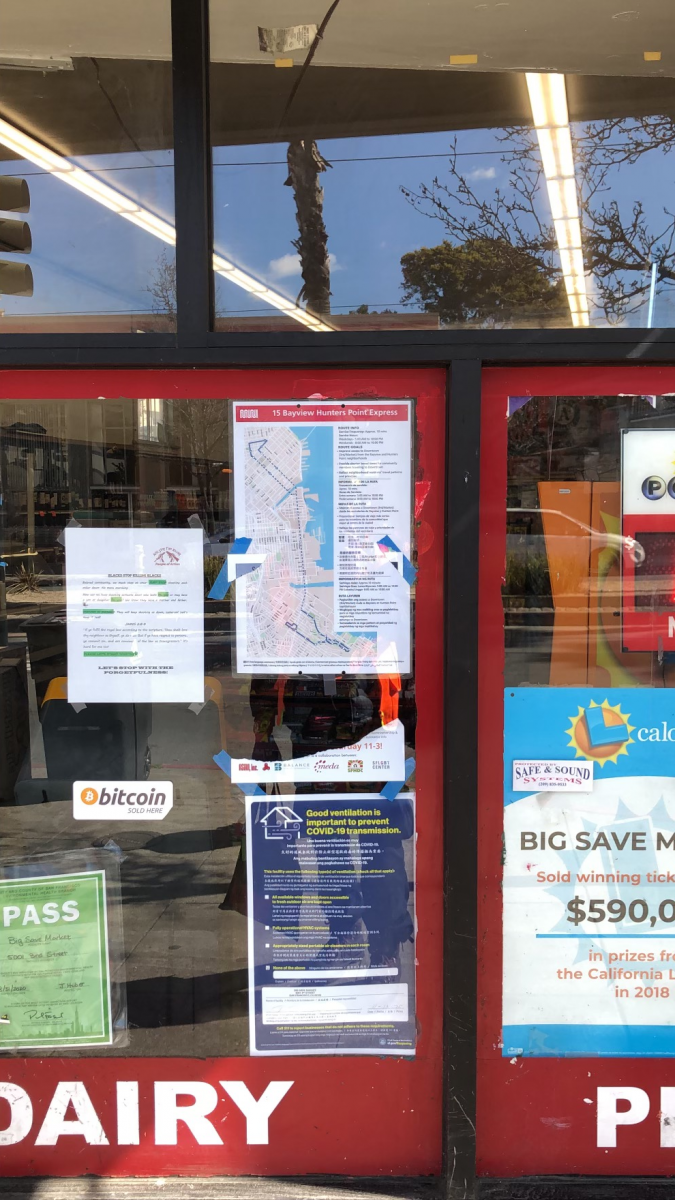
15 Bayview Hunters Point Express signs were posted at businesses along Third Street
Community members are encouraged to provide comments on the 15 Bayview Hunters-Point Express by completing the online Muni feedback form.
Published March 26, 2021 at 08:57PM
https://ift.tt/3svsJig
Show HN: We made a 3D landing page for our product https://ift.tt/3lVyuTL
Show HN: A Chrome extension to see notifications for comments on your HN threads https://ift.tt/3fhi2fi
Show HN: Source generator for SQL commands in C# https://ift.tt/3coPpuR
Show HN: Superadmin – No Code Visual Testing Made Easy https://ift.tt/3cnoGyN
Hate is a Virus
By Jonathan Streeter
As a city we stand united against racism. While violence resulting from racism has been more visible in recent years, many of our colleagues and community members have been surviving the violence resulting from racism for generations. This is especially true for many Black, Indigenous, Latinx, Asian, and Pacific Islander communities that have often grappled with the effects of racism in silence or without widespread acknowledgement and support.
Hate against Asian American Pacific Islander communities has risen at an alarming rate during the COVID-19 pandemic.
Anti-Asian violence has been fueled by rhetoric baselessly blaming people of Asian descent for the outbreak and spread of COVID-19. We condemn all forms of racism and xenophobia and stand in support of any marginalized groups who are being targeted.
Let’s continue coming together to stop racism in all its forms, including Asian discrimination. We can all do our part to stop bias, hate, and violence by educating ourselves and taking action.
One action to take today is enrolling in Hollaback’s online training, Anti-Asian/American and xenophobic harassment. The organization has partnered with Asian Americans Advancing Justice to launch a free bystander intervention training to meet this moment.
As this year has shown, San Franciscans excel at connecting with each other in order to create the change we want to see in our city and the world. And we can do it again.
Published March 26, 2021 at 03:46AM
https://ift.tt/3sAHCzG
Show HN: Smokeshow – deploy ephemeral sites via HTTP or CLI https://ift.tt/31gSpTV
Show HN: Pixeltex – a fun little LaTeX and emoji pixel typesetter https://ift.tt/3d5KYnX
Show HN: I wrote a book about Elasticsearch https://ift.tt/3rllRCH
Show HN: Stricks – managed C strings library https://ift.tt/3rlaVVF
Thursday, March 25, 2021
Show HN: Trove – Curate and publish a knowledge base on any topic https://ift.tt/2NWkLzM
Show HN: Encrypt then upload files/videos to Discord to use on your website https://ift.tt/2Pr2lHR
Show HN: Laravel Artisan Cheatsheet https://ift.tt/2NSVlD9
Show HN: Half Lemons – recipes with the ingredients you have on hand https://ift.tt/2P5MFK8
Show HN: CrowdX, A tiny MobX-like reactivity library in less than 3k https://ift.tt/39aaOGj
Show HN: WebAssembly and ffmpeg = Quick clip, overlay, resize and GIF-ize videos https://ift.tt/3sh8On7
Show HN: Ruby Range Syntax in JavaScript https://ift.tt/39gsrEl
Show HN: Hoppscotch – Open-Source API development ecosystem https://ift.tt/3lPxsc0
Show HN: I built a VS Code Theme Creator – easily make VS Code themes in browser https://ift.tt/2P5pRu0
Show HN: Package https://ift.tt/3lSWGqa
Show HN: Wikiyarn – Smarter way to browse Wikipedia https://ift.tt/3d4lAz0
Show HN: A link aggregation site for health content and global news https://ift.tt/31npPA1
Show HN: Arc, an Open Source Databricks Alternative https://ift.tt/39crHzX
Show HN: Beeple Generator https://ift.tt/39cX4e1
Show HN: Nyum, a Pandoc-powered static site generator for your recipe collection https://ift.tt/3lLelzY
Show HN: I wrote a book about my side-project https://ift.tt/2NQaSDJ
Show HN: I build a cross-platform zero-based budgeting app: InstaBudget https://ift.tt/39cVg4z
Show HN: Fstalign – A fast and efficient text alignment tool https://ift.tt/3rdfz8c
Wednesday, March 24, 2021
Show HN: A TypeScript API for constructing XPath 1.0 expressions https://ift.tt/3fc6bzs
Show HN: I wrote a book about Go https://ift.tt/3rixkTt
Show HN: Ape Playground https://ift.tt/3d4eFWl
Show HN: SEC 13F Filings – Investment Manager Quarterly Holdings Data https://ift.tt/3tRdy3i
Show HN: Grid – turn existing spreadsheets into interactive web documents https://ift.tt/3tOeUM7
Show HN: Encrypt the root partition of a Raspberry Pi stock image https://ift.tt/398uYjK
Show HN: Wi-Page – Rank Wikipedia Article's Contributors by Byte Counts https://ift.tt/3fasXHW
Show HN: Search engine to find who is working with your target company https://ift.tt/31g76GC
Show HN: Bangle.dev – Collection of tools for building rich text editors https://ift.tt/2QzYuss
Show HN: Suspend Digitalocean Droplets to Disk and Save on Cloud Cost https://ift.tt/31bTMmK
Show HN: New GraphQL Framework for TypeScript https://ift.tt/399Yupw
Show HN: TxtFiddle – JavaScript playground for text manipulation tasks https://ift.tt/2PgfLpT
Tuesday, March 23, 2021
Show HN: Runway – Release apps with less bouncing between Jira/GH/CI/Apple/Slack https://ift.tt/3f7bOi9
Show HN: Programmer’s Poop NFT https://ift.tt/3rdj6Dp
Show HN: Opytimizer – A Nature-Inspired Python Optimizer https://ift.tt/393Cxs9
SFMTA Supports San Francisco Small Businesses Through Construction and COVID-19
By Sophia Scherr
Local small businesses are what give San Francisco its eclectic and unique charm. Running a small business in San Francisco isn’t an easy feat either, especially over the past year. Therefore, it’s imperative that SFMTA’s projects not only provide resources to businesses that are impacted by construction but are also responsive to COVID-19 concerns as well.
Through our partnership with the Office of Economic and Workforce Development (OEWD), we have been able to provide an additional layer of support to businesses along project corridors including the Geary Rapid Project, Van Ness Improvement Project and L Taraval Improvement Project. The SFMTA project teams have made it a standard practice to include dedicated support as part of every major capital project. OEWD staff undertake door-to-door outreach and provide information and assistance with grant applications and other city resources that are available to impacted business owners. This partnership with OEWD is just one of many tools in SFMTA’s toolbox to ensure that our small businesses can thrive.
Projects like the Geary Rapid Project span diverse neighborhoods, each with differing needs. Project staff therefore customized outreach and engagement with small business owners and merchant groups for each of the unique business corridors along the corridor: Union Square, the Tenderloin, Japantown and the Fillmore.
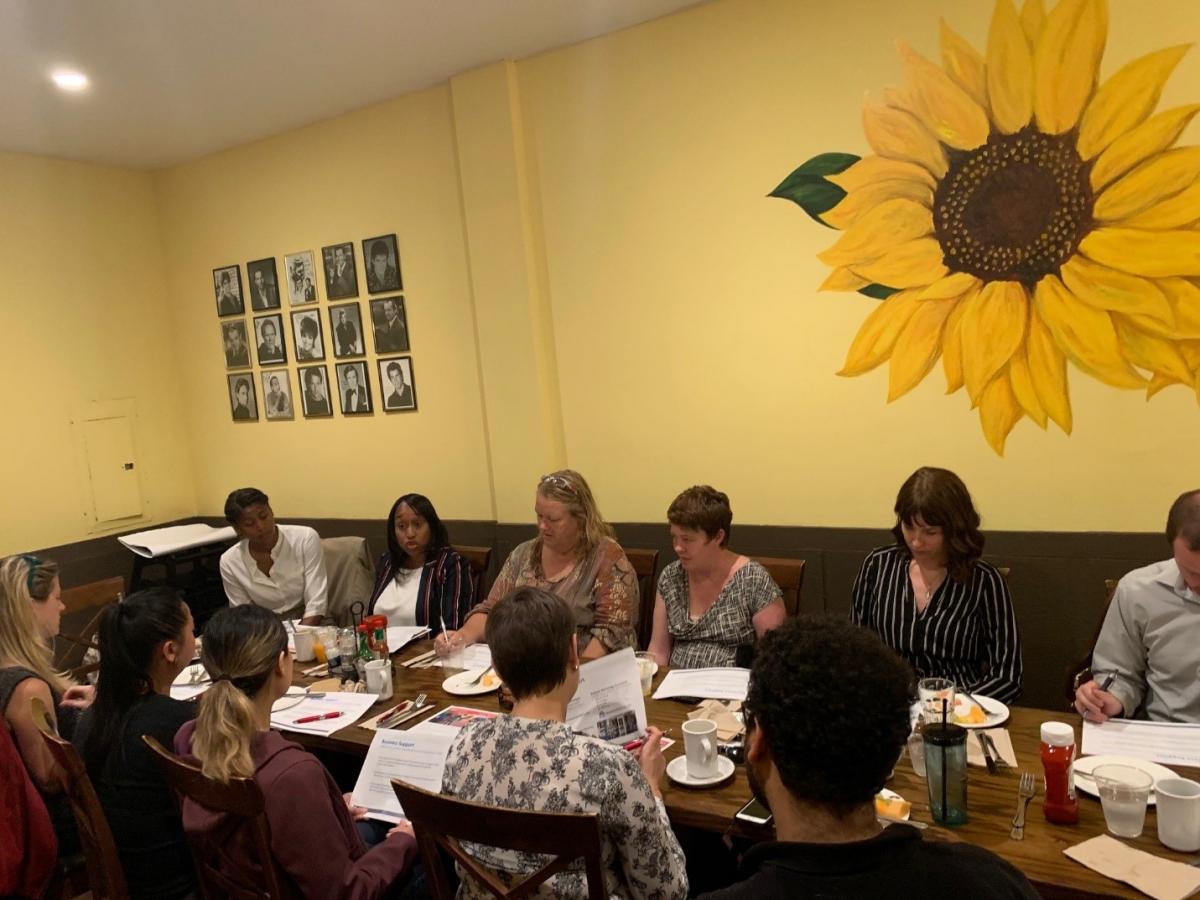
Geary Rapid Project and OEWD staff meet prior to COVID-19 with Fillmore Merchants to discuss upcoming construction
Prior to construction starting in a neighborhood, SFMTA and OEWD staff held frequent meetings with merchant groups and business owners to describe the anticipated impacts of construction and determine which support-resources best fit their needs. Once construction began, each merchant corridor was provided business wayfinding signage in line with their branding, as well as to fit the look and feel of the neighborhood. This wayfinding signage helps to raise the visibility of businesses, so that patrons can still find and access their favorite stores throughout construction.
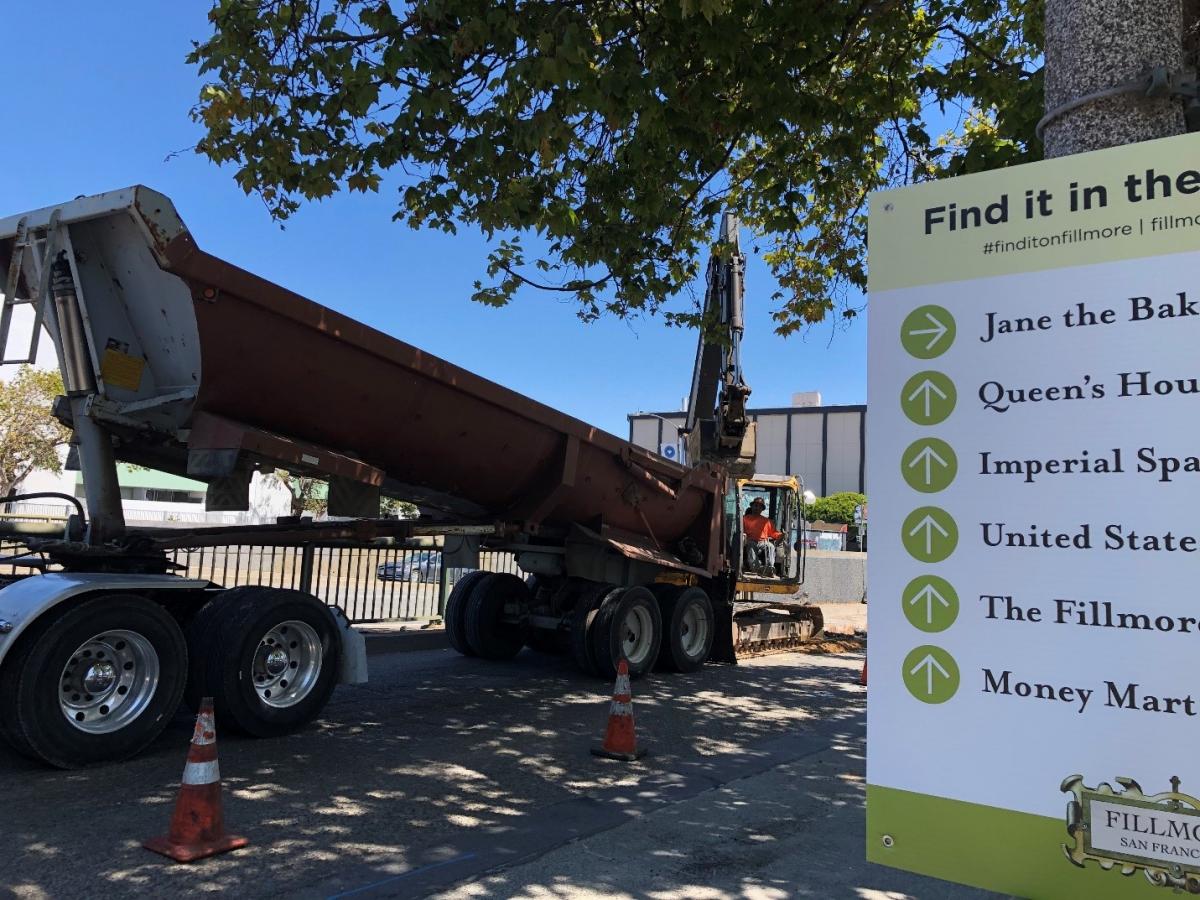
Wayfinding signage next to Construction Crews working in the Fillmore
COVID-19 and shelter-in-place orders only compounded pressure on small businesses already feeling the effects of construction. In response, SFMTA staff and merchant groups worked together to develop new ideas on how to keep customers coming during this challenging time. Small businesses, local events, and COVID-19 resources were featured within the project’s weekly construction forecast, which is sent to over 3,000 subscribers.
Each group also collaborated with staff to determine what type of marketing support would best suit them, and when was the best timing given the changing nature of shelter-in-place restrictions. The results were a mix of traditional and new approaches of promoting local merchants. For example, the Japantown Merchants Group chose an advertising campaign to promote visiting Japantown, featured inside and outside of buses throughout the Muni network. The Tenderloin Community Benefit District took a social media approach and promoted visiting restaurants and stores via targeted Facebook ads.
No matter the chosen method, providing targeted support is a proactive way for the SFMTA to help small business during these trying times, so they are able to remain open as our city begins the re-opening process.
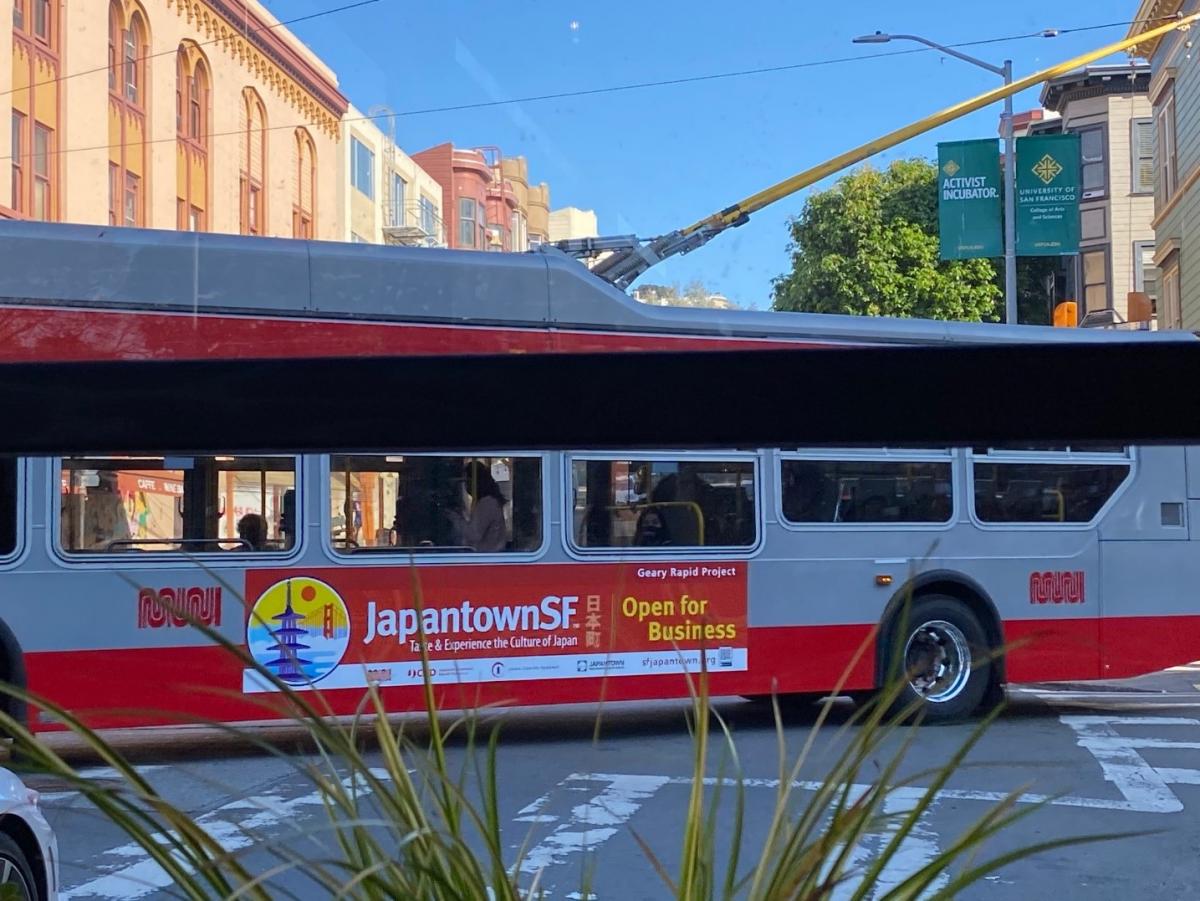
Bus ad produced for Japantown as part of the Geary Rapid Project Business Support Program
Of course, we recognize that in the past not every SFMTA project has been smooth sailing when it comes to construction. However, we have built upon our experience as a lesson for projects currently underway, and for those being planned. We have learned that consistent, personalized outreach and having project staff dedicated to addressing issues directly and quickly are essential to building and fostering meaningful relationships that maximize opportunities, and minimize the impact of construction.
Published March 23, 2021 at 10:00PM
https://ift.tt/2QtB1ZP
Show HN: hdoc, the modern documentation tool for C++, is now open source https://ift.tt/3tHOgUY
Show HN: Episuite, open-source framework for epidemiology in Python https://ift.tt/3rdlSZr
Show HN: PyWebIO – Write interactive web app in script way https://ift.tt/3sjyCPu
Show HN: Email-untracker: Get rid of tracking links and spy pixels (self-hosted) https://ift.tt/399BbvX
Show HN: Sendfiles.dev – quick, secure P2P file transfer using WebRTC https://ift.tt/3lI4f2L
Show HN: Create an infinite scrolling blog roll in Rails with Hotwire https://ift.tt/3tMvlbL
Show HN: First AI generated news letter(powered by GPT-3) https://ift.tt/3lDZ5Vx
Creating a Better Market Street: Car-free Enforcement to Resume
By Mariana Maguire
It’s been over a year since Market Street went “car-free” on January 29, 2020, but shortly afterwards, the COVID-19 pandemic shut down our city and changed how people move through San Francisco. As the city begins to reopen and vehicle traffic is increasing, we are by stepping up compliance and enforcement efforts to keep Market Street car-free starting March 29, with the help of SFMTA’s Parking Control Officers (PCOs) and the San Francisco Police Department (SFPD).
Under the year-old car-free rules established as a part of Better Market Street, no private vehicles are allowed to travel along Market Street eastbound from 10th to Main streets or westbound from Steuart Street to Van Ness Avenue. Traffic is still allowed to cross Market Street, but there are no turns allowed onto the street in the car-free area. These restrictions apply to all private vehicles, including Uber, Lyft, Postmates, DoorDash, and other services whose drivers use personal vehicles without a commercial license plate.

Map: Car-free area on Market Street, implemented January 2020.
Enforcement of compliance will increase starting March 29 and will continue for about a month to help remind drivers of the restrictions. PCOs and police officers will monitor the street at various locations. PCOs will wave on vehicles attempting to turn onto Market Street within the restricted area. During the first week of the campaign the SFPD will issue warnings to drivers as we ramp up education efforts. Thereafter, they will issue citations to vehicles in violation of the car-free restrictions.
These efforts are in direct response to violations and concerns we’re heard from people that private vehicles are still driving in the car-free area. We also understand and appreciate concerns around police enforcement and we’re working hand in hand with SFPD to address those concerns.
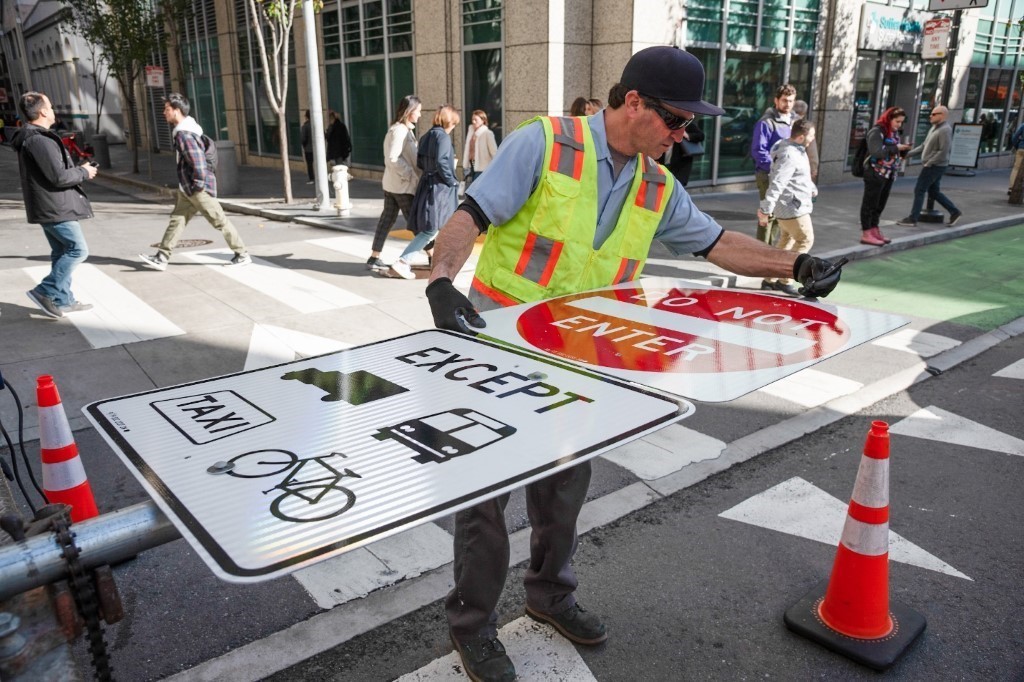
Photo: Crew member installing new signage on Market Street in January 2020
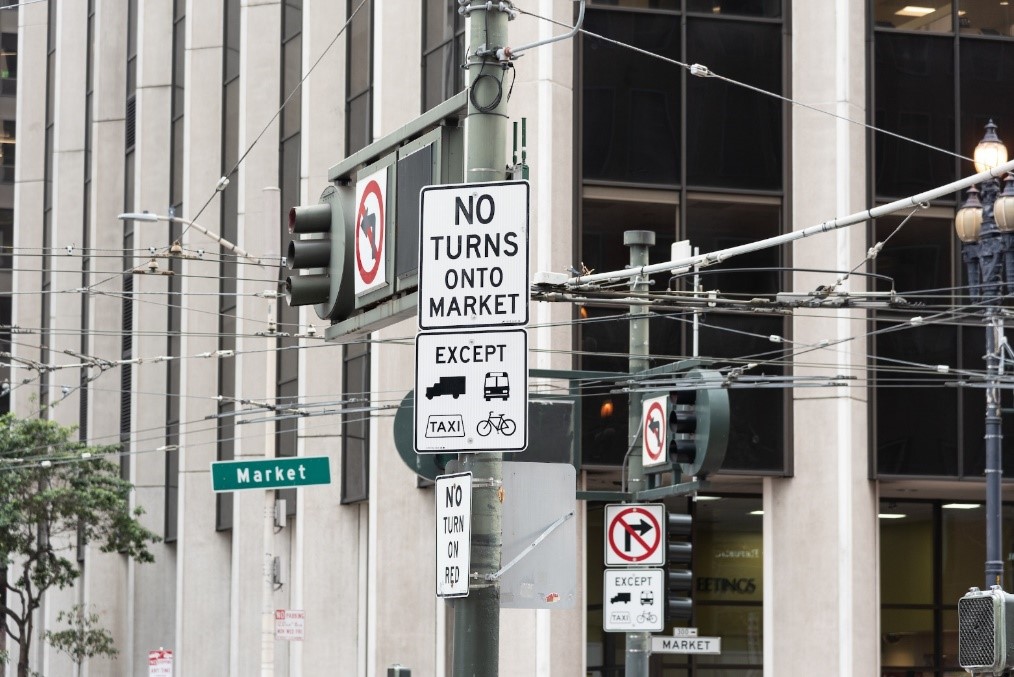
Photo: Car-free Market Street signs limiting private vehicles from driving on Market Street east of Van Ness Avenue.
Vehicles that are still allowed to use Market Street:
- Muni and other transit service vehicles
- Taxis
- Paratransit
- Licensed commercial vehicles
- Emergency service vehicles
- Bicycles
- Scooters
Don’t get ticketed! If you’re not one of the vehicles above, don’t drive on Market Street east of Van Ness Avenue. Pay close attention to signage like those shown in the photos. If you’re using a navigation app it will route you around the car-free area.
Please help us spread the word to family, friends, neighbors and coworkers. Plan your trips accordingly. Consider alternate modes of travel if you’re going downtown. If you need to use your personal vehicle to reach destinations along Market Street, take alternate streets – they’re open!
Keep checking the COVID-19 Muni Core Service Plan website for the latest Muni service as we continue to expand and restore additional Muni rail routes which will improve transit service along Market Street.
Published March 23, 2021 at 05:08AM
https://ift.tt/3f75iIe
Show HN: Art × Engineering https://ift.tt/3vOns7B
Show HN: Cloudboost.io – open-source BaaS platform just like Firebase https://ift.tt/2PckSaB
Show HN: Distributed – Live social chat app to help remote teams stay in sync https://ift.tt/393yOuy
Show HN: Reclist.me – Share your favorite books, podcasts, newsletters https://ift.tt/3lFuAhL
Monday, March 22, 2021
Show HN: I wrote a minimal deep learning library from scratch in Python https://ift.tt/3vQM7rV
Show HN: LogoMaker – Easily create and download free logos [no email required] https://ift.tt/3tKPpv7
Show HN: I landed a Data Science job without a Data Science degree https://ift.tt/3f0BCMV
Show HN: Career Vault – The largest database of active remote jobs https://ift.tt/3lCRW7I
Show HN: Regular expression compilation visualized https://ift.tt/3rdXWF3
Show HN: SimpleR State – simplest state management for React https://ift.tt/3cXmoFI
Show HN: Put Localhost on the Internet Instantly https://ift.tt/3rhc3tD
Show HN: xocc – C compiler based on BSD license https://ift.tt/3caMBlf
Show HN: Control a Synth with Your Webcam https://ift.tt/3vMwSjX
Show HN: AccessiByeBye – An Accessibility Overlay Blocker https://ift.tt/3tI9cLH
Sunday, March 21, 2021
Show HN: Database of Business Strategies https://ift.tt/3tUyHd1
Show HN: Programmable browser you embed in your app https://ift.tt/3sa1KbJ
Show HN: Make continuous reforestation part of your daily workflow https://ift.tt/3tD1sL1
Show HN: Online communities indexed by topic, platform, features https://ift.tt/3vLkxMV
Show HN: Papercups – open-source alternative to Intercom https://ift.tt/3vIK4Gt
Show HN: Minimalist Web Components for your static website https://ift.tt/390DvFC
Show HN: Wi-Stalk – Analyze Wikipedia User's Activity https://ift.tt/318gCvj
Show HN: Goober.rocks https://ift.tt/2OTNc1x
Show HN: I calculated the monthly cost of ownership for products https://ift.tt/3cQyj8d
Show HN: Catalst – Find out who has a crush on you https://ift.tt/391DLUD
Show HN: An online game I've been working on (eolsh) and its server architecture https://ift.tt/390hgzC
Saturday, March 20, 2021
Show HN: AdBlock-Decoder, a helpful tool to extract domains from a filter list https://ift.tt/3tF3wlz
Show HN: Polar Bear Blog – Minimalist Markdown Blog for Google Cloud Run https://ift.tt/39053dY
Show HN: Alkymi – Data/Task Automation in Python https://ift.tt/3tDrwp7
Show HN: Schedulr – Meeting Scheduling Automation https://ift.tt/2NASpLh
Show HN: My site texts you if Covid vaccine bookings are available https://ift.tt/3f1yro6
Show HN: Libmon – Tokens to monetize your library and offer trials https://ift.tt/3vHN2uW
Show HN: Developer First Engineering Metrics https://ift.tt/3r7z5CN
Show HN: Finger Pool, play pool with your finger https://ift.tt/2P6Omqk
Friday, March 19, 2021
Show HN: SQLGlot – Customizable Python SQL Transpiler https://ift.tt/3s9wb24
Show HN: Drovio – Remote pair programming tool https://ift.tt/3901ODD
Show HN: Infracost diff – “Git diff” but for cloud costs https://ift.tt/3cLmXTa
Show HN: Enough Tea – NFTs for Anything https://ift.tt/2PcluNe
Show HN: Hoppy – Public IPv4 and IPv6 Addresses over WireGuard https://ift.tt/2Qm5tVP
Show HN: Video Game in a Font https://ift.tt/2PasyKh
Show HN: Usage and crash reports for Python libraries and command line tools https://ift.tt/3tCAQdc
Show HN: Glue – Pandas as a DAG https://ift.tt/3s3kmdo
Show HN: R/shouldibuythisproduct because Amazon reviews is broken https://ift.tt/3lscos3
Show HN: Inventhub – Electronics product design collaboration platform https://ift.tt/2ODcYHv
Show HN: SpectaQL – auto-generate GraphQL API documentation https://ift.tt/3s2Q1M6
Show HN: A Directory of Personal Blogs https://ift.tt/3ls7bjQ
Show HN: Chat builder – Build a fully customizable open source chat-widget https://ift.tt/3cH7CCW
Thursday, March 18, 2021
Show HN: Generate stick figure GIFs from a webcam using openpose https://ift.tt/3vEwST2
Show HN: LitiHolo – a desktop 3D hologram printer that makes true holograms https://ift.tt/38TfDUq
Show HN: Sorted CSS Colors – Sort the named CSS colors in a nice way https://ift.tt/38WlI2l
Show HN: Obsidian - OTP Authenticator https://ift.tt/3qWXOJZ
Get On Board for Your Driver
By Lori Phelan
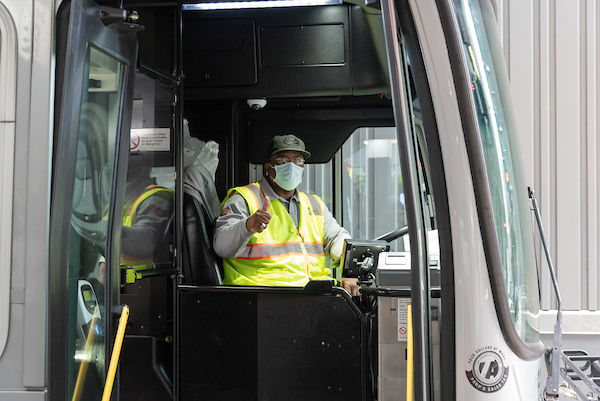
Today is Transit Worker Appreciation Day, a national day of recognition to thank and celebrate the public service of transit vehicle operators and support staff who keep our cities moving. Operating any vehicle in a city like San Francisco is not easy, yet our operators strive to provide a comfortable ride while navigating large-capacity buses with precision through city streets and traffic. We recently celebrated hundreds of Muni Operators with years –even decades-- of “safe driver” experience, having had no avoidable collisions. We also celebrate the hundreds of mechanics, car cleaners, and other critical personnel who keep vehicles safe and operational.
Muni’s transit operators and support teams have been on the job in San Francisco throughout the COVID-19 pandemic, providing essential service at a time of unprecedented challenge and uncertainty. In addition to keeping our Muni Core Service Plan rolling during shelter-in-place, many of our Cable Car and rail operators have served as ambassadors while rail service was suspended, distributing masks, assisting customers while waiting for Muni and keeping the public informed about how to get to where they want to go.
In addition to our 2,500 Muni operators, there are nearly 3,000 taxi and 100 paratransit drivers in San Francisco, all of whom have had to manage the unique constraints the pandemic has imposed. This workforce has proven more than equal to the challenge of the past year.
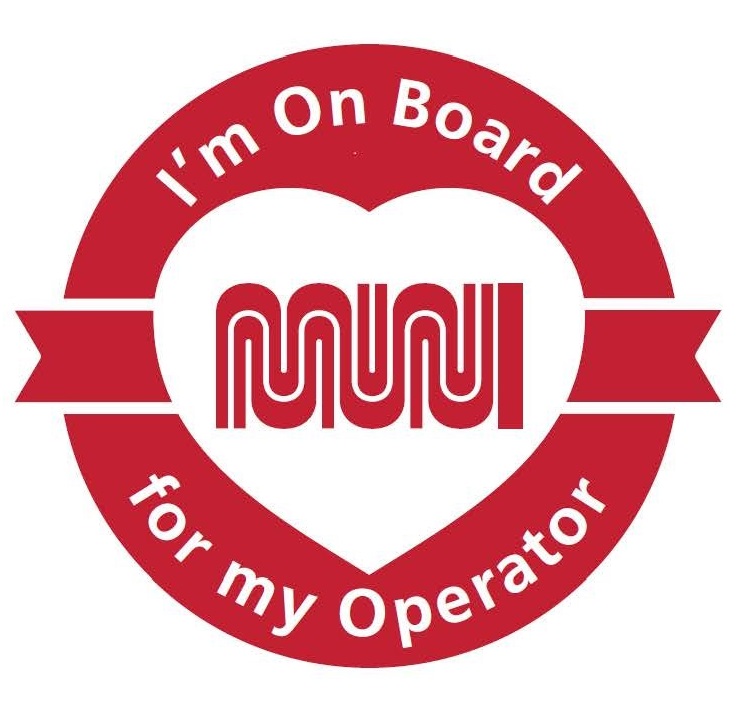
If you’d like to get on board with supporting an operator or other worker who made your day just a little bit brighter this past year, please consider participating in Transit Worker Appreciation Day and saying thank you by:
- Posting thank you messages, photos or videos to social media with the hashtag #TWAD (Transit Worker Appreciation Day) or #ILoveMyMuniDriver.
- Submitting an official commendation online through Muni Feedback -- provide details about your experience so that we can identify the employee and ensure that they receive kudos.
- Giving a thumbs-up on MuniMobile app's RateMyRide.
And remember, a simple smile or thank you works any day – for which there are 365 opportunities each year.
Published March 18, 2021 at 07:40PM
https://ift.tt/3vDWOOE
Show HN: Freeciv-Web https://ift.tt/3tCtCpv
Show HN: LDAP DN – PHP library for parsing and manipulating Distinguished Names https://ift.tt/3tycuRO
Show HN: Public SSH Jump and Port Forwarding Server https://ift.tt/3qWQK09
Show HN: Flat Habits – Org mode habits on iOS https://ift.tt/2P4t3pc
4th Street Bridge Transit Lanes Ease T-Third Bottleneck
By Erin McMillan
In January, along with other proposed and planned key locations across the city, the SFMTA Board of Directors approved temporary emergency transit lanes for the 4th Street Bridge. These temporary lanes address a key bottleneck that delays the T Third line on 4th Street northbound and southbound between Berry and Channel Streets.
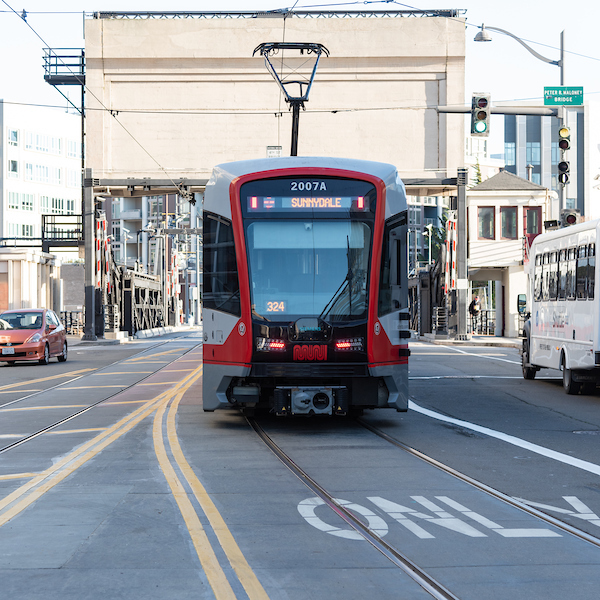
A Sunnydale-bound T Third train approaches the 4th Street Bridge
As a response to community feedback, the project team developed a two-phase implementation of the temporary transit lanes to allow for an evaluation of their effectiveness before fully restricting northbound bridge traffic.
The initial evaluation of the first phase has been completed, and data shows that partial implementation was effective in allowing Muni trains to travel across the bridge with little delay.
Currently, northbound left turns are restricted from 4th Street onto Berry Street. The previous left turn pocket at that location was converted to a temporary transit lane, while northbound through-traffic continues to be allowed on the bridge. As the city emerges from the public health order to less restrictive tiers, we will perform an additional evaluation of the existing Phase 1 implementation. If that analysis determines that northbound private vehicle traffic on the bridge has begun to cause delays to the T Third, the single northbound lane will be restricted temporarily to transit only between Berry and Channel Streets as a second phase of the project.
A summary of this phased approach is provided below.
Phase 1: Complete. Evaluation of this phase began after the T Third resumed service in late January:
- A southbound temporary emergency transit lane was installed in one of the two southbound lanes on the 4th Street Bridge
- Northbound left turns are now temporarily prohibited from 4th Street onto Berry Street
- The left turn pocket in the northbound direction from 4th onto Berry Street was converted to a temporary transit lane
Phase 2: If a change in emergency order tiers shows that traffic is causing transit delay on the 4th Street Bridge:
- A northbound temporary transit-only lane will be installed in the sole northbound lane on the 4th Street Bridge
- Northbound traffic will not be permitted on the 4th Street Bridge, with these additional temporary restrictions:
- Heading north on 4th Street at Channel, no through traffic onto the 4th Street Bridge (right or left turn required)
- Heading east on Channel, no left turn onto the 4th Street Bridge
- Heading west on Channel, no right turn onto the 4th Street Bridge
- Southbound general traffic will continue to be permitted
Evaluation of the phased approach
Our Phase 1 evaluation included site visits and several weeks of monitoring traffic on and around the 4th Street Bridge. Our chief metric was whether general traffic blocked trains on the shared northbound lane across the 4th Street Bridge. If northbound traffic blocked trains more than 5% of the time, our plan was to implement Phase 2. Periods of evaluation included morning, mid-day, and afternoon/evening peak.
We also monitored train travel times using location data from T Third train tracking devices to identify when trains experienced the longest travel times on the 4th Street Bridge. Because this data showed few instances when trains were blocked by northbound traffic, we paused implementation of the second phase.
Initial Phase 1 Evaluation Results
Our data demonstrated that Phase 1 was successful in decreasing transit delays and protecting trains from traffic congestion. With the temporary emergency transit lanes in place:
- On average, overall transit delay decreased by 63% at the of 4th and Berry streets.
- T Third trains are now 2.5 times more likely to travel through the 4th and Berry street intersection without having to stop for a red light.
- When trains do encounter a red light, the average wait time for a green signal is 70% shorter
- With Phase 1 in place, T Third trains were delayed by traffic congestion less than 1% of the time
Next steps
Our ongoing evaluation of the project will include a community survey in mid-March as well as continued technical evaluation of the effectiveness of these temporary transit lanes. A renewed technical evaluation will take place with the changing of tiers in the city’s emergency public heath order.
For additional information on this project, and to sign up for updates, check out the 4th Street Bridge Temporary Emergency Transit Lanes webpage.
Published March 18, 2021 at 02:48AM
https://ift.tt/3vzBjP1
Show HN: Attract more customers by highlighting why people trust you https://ift.tt/30Pr9LU
Show HN: Visa-CLI https://ift.tt/3qZvLJY
Show HN: Walk in and out of conversations as you would IRL with up to 25 people https://ift.tt/3qWf1TW
Show HN: PBJ Live – Add live streaming to any app or website in ~6 LOC https://ift.tt/2OAaz0h
Wednesday, March 17, 2021
Show HN: Find all names, testimonials, logos in a webpage https://ift.tt/2OFzU8M
Show HN: Mailto-links are dead. Long live mailto.id https://ift.tt/3bWofeU
Show HN: Cloud GPUs for Deep Learning – At 1/3 the Cost of AWS/GCP https://ift.tt/3bVb2Tg
Show HN: Aphros – create and share a simulation of fluids, bubbles, and drops https://ift.tt/2OGT0vo
Show HN: A platform for EV owners to share their pros and cons https://ift.tt/3qVAI6A
Show HN: Dendron – Super Fast Open Source Note-Taking in VSCode https://ift.tt/3tvCTiU
Show HN: Useful Linux tool, Find wrapper in Bash script https://ift.tt/2NrcEeh
Show HN: I wrote a free book on mastering OpenSCAD https://ift.tt/3qSnk37
Show HN: O(log n) makes continuous profiling possible https://ift.tt/2OJ4234
Muni and SamTrans Partner on Lake Merced Bus Service
By Enrique Aguilar
Starting March 22, a new program will provide free access to SamTrans Route 122 within San Francisco between Lake Merced Boulevard and Lake Merced Hill. The SFMTA has teamed up with SamTrans to launch this pilot program, which allows residents to sign up to use the 122 while Muni service is limited due to COVID-19.
After applying to the program, customers will be sent an email with a MuniMobile pass link that will be valid for six months. There will be an opportunity to extend the pass if the program is still needed after that, pending the return of Muni’s 57 Parkmerced.
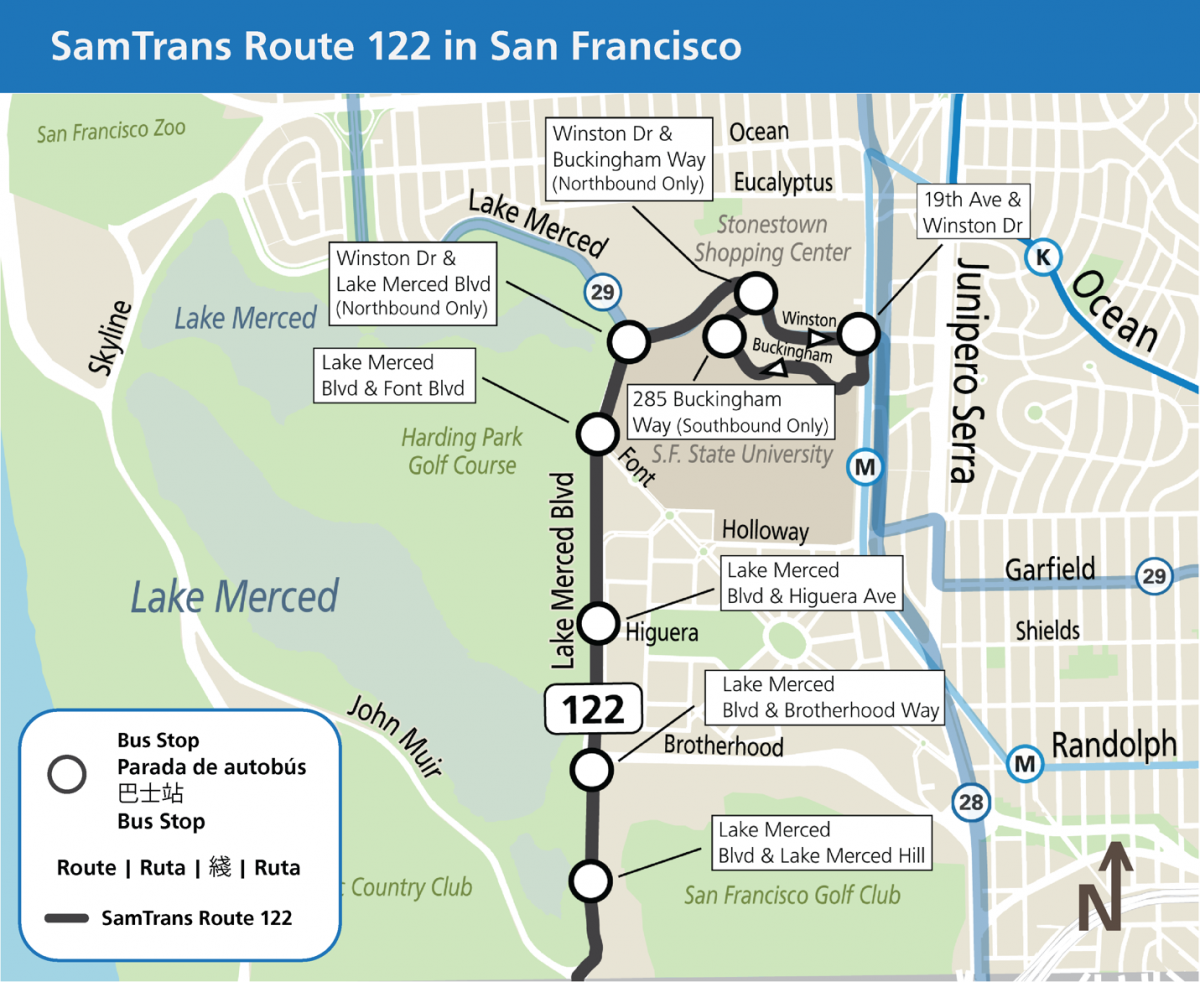
Map of new SamTrans stops in the Lake Merced neighborhood
The SFMTA will post signs at the new bus stop locations and at essential destinations including grocery stores near Stonestown Galleria Shopping Center in order to inform community members about this free pilot program. For more information and to apply, visit the Samtrans Route 122 application page.
Published March 17, 2021 at 04:53AM
https://ift.tt/3cAsfAG
Show HN: Tellspin – Round robin rotation for at-mentions in Slack https://ift.tt/3lmfZHS
Show HN: A lightweight movie streaming platform for aspiring indie filmmakers https://ift.tt/3cG26Al
Show HN: Free Design Resources for Developers https://ift.tt/38KxE7i
Show HN: A Simple Morning Brew Style Email Template Builder https://ift.tt/2Q7qL9r
Tuesday, March 16, 2021
By The Numbers: The SFMTA’s COVID-19 Response
By Erica Kato
The COVID-19 pandemic has brought about unforeseen changes to San Francisco’s transportation network. And the impact of the crisis will continue to be felt city-wide long beyond the end of the public health emergency. On March 13, 2020, when it became clear that San Francisco needed immediate adjustments to the transportation system, Director of Transportation Jeff Tumlin launched SFMTA’s Department Operations Center (DOC) team. Since then, the DOC has served as a centralized hub to ensure that we are minimizing health risks to employees and the public as we keep transportation running, both by coordinating internally within the agency and by collaborating closely with our city, state, and federal partners to deploy resources and information in the most effective way possible.
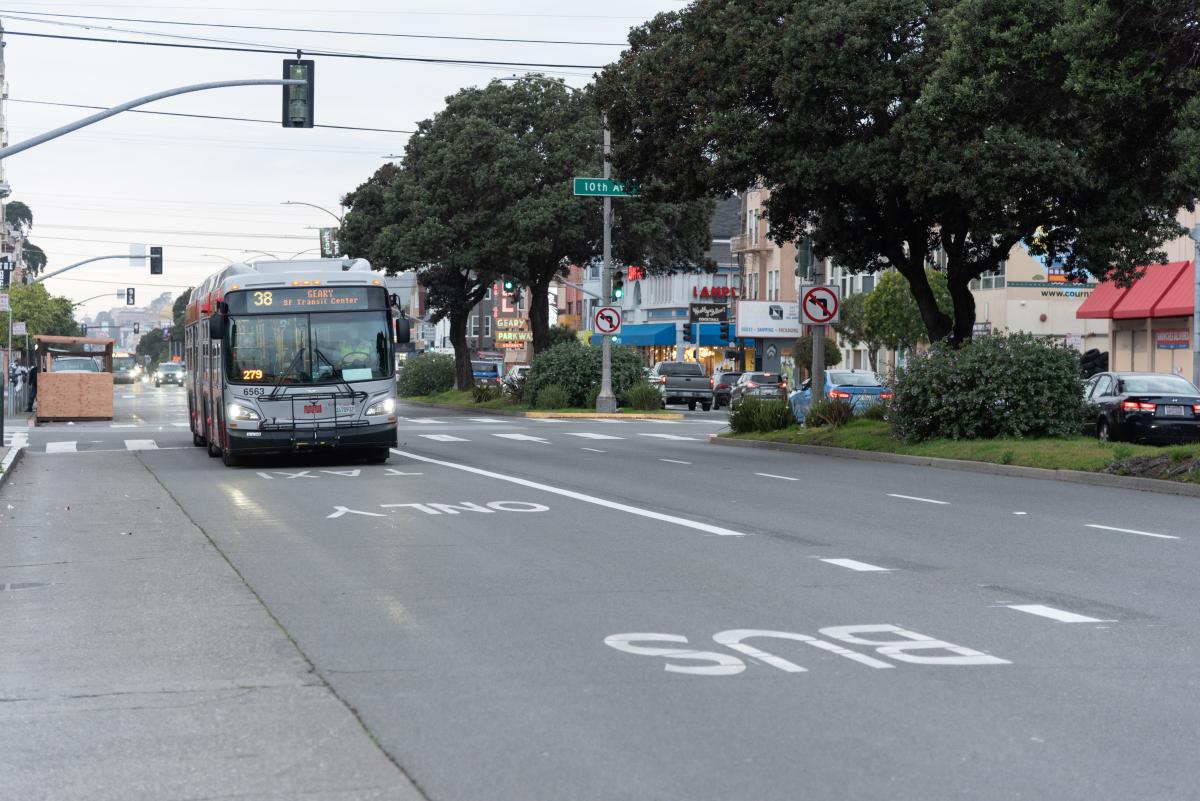
San Francisco's response to the COVID-19 pandemic included implementing temporary emergency transit lanes
Our COVID-19 response has challenged us to break down silos, think creatively, and expedite processes and practices that have traditionally required long lead times. We designed and implemented creative uses of public space that opened new avenues for enjoying San Francisco even in a time of physical distancing. In the midst of a once-in-a-lifetime public health crisis, our staff has risen to the occasion and has delivered projects keen on keeping San Franciscans moving. Now, a walk across any San Francisco neighborhood is characterized by its Slow Streets, outdoor dining configurations, and new opportunities to rediscover the type of outdoor recreation synonymous with San Francisco. Iconic areas like the Great Highway, Golden Gate Park, and the top of Twin Peaks are now more accessible to more people than ever before.
Here's a snapshot of some of SFMTA’s accomplishments over the past year, by the numbers:
- Slow Streets
- Implemented 25 temporary corridors, comprising 44 lane miles.
- Making first three permanent; comprising 8 miles on Page, Sanchez, and Shotwell streets.
- Surveying residents along all 25 Slow Streets corridors; with plans to present results to the SFMTA Board in July 2021
- Temporary Emergency Transit Lanes
- Implemented four key corridors, including 7th and 8th streets, Downtown Mission Street, Geary Boulevard and the 4th St. Bridge
- Vision Zero
- Installed 80 miles of street safety improvements in 2020 (more than 30 of which are on the High Injury Network)
- Implemented
- 6.5 new miles protected bikeways
- 11 miles with slower speed limits
- >300 continental crosswalk upgrades
- >150 signals upgraded additional crossing time for people walking
- >60 signals upgraded with leading pedestrian intervals
- Taxi industry support - distributed:
- 14,504 gloves
- 3,469 masks
- 830 hand sanitizers
- 87 gallons of disinfectant refills
- 259 rolls of paper towels
- 822 plastic shields installed between front and rear seat
- Streetscape Improvements:
- 16,171 COVID-related signs installed by the Sign Shop
- Jammed parking meters reduced to < 2% citywide, before pandemic >30%
- Installed 1,069 bike racks
- Daylighted almost 1,500 corners
- Permits for over 8,000 shared bikes/scooters/mopeds
- 174,000 trips in January
71% of San Francisco residents were within 1/4 mile of a shared mobility option such as a bike (classic and e-bike), power scooter, or e-moped by January of 2021.
Muni:
- Sanitized 800+ transit vehicles twice per day; hired 43 additional car cleaners along with three assistant supervisors and one manager
- Distributed 627,074 masks between July 2020 and March 2021
- To SFMTA employees – 434,349
- To members of the public – 192,725
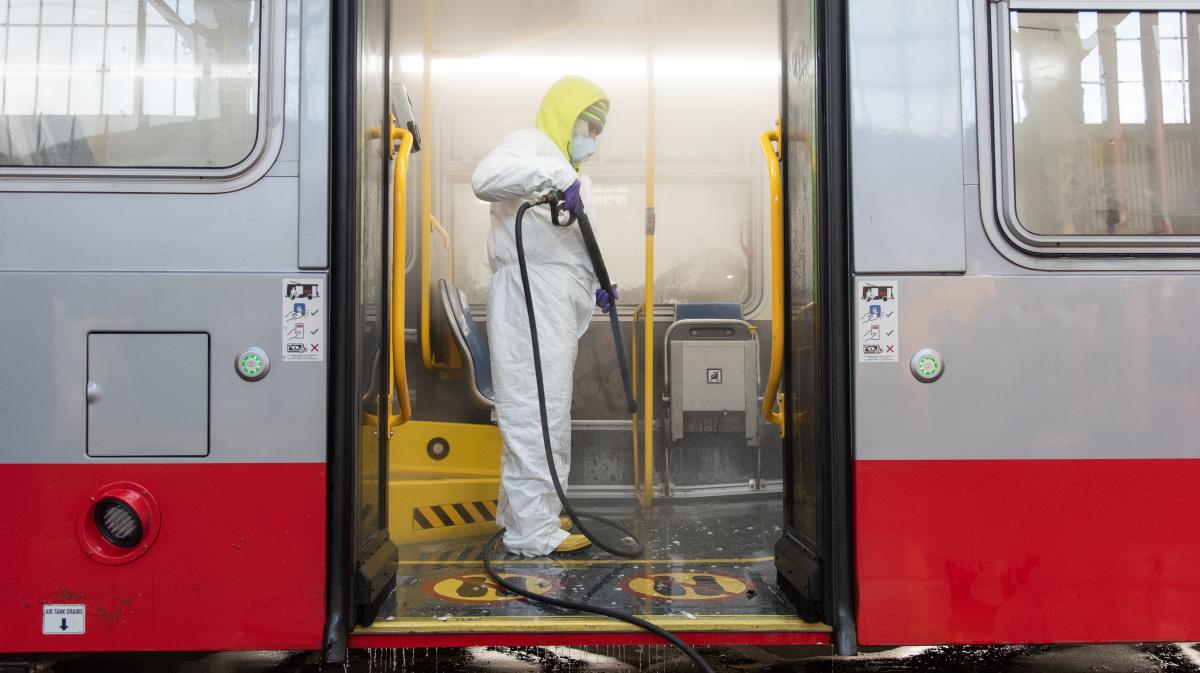
A car cleaner sanitizes a Muni bus before it's returned to service
COVID-19 has led to personal impacts to so many of us. Over the course of this last year, 246 SFMTA employees have tested positive for COVID-19, and sadly we lost two colleagues to the virus. Many more colleagues have been affected by illness or loss of their family members or friends.
Through proactive safety measures, the SFMTA has been able to minimize transmission of COVID in the workplace. With the widescale spread of COVID in society, 4.1% of staff have tested positive for COVID, which is consistent with regional rates and is less than half of statewide infection rate of 8.9%.
With the release of a vaccine, we look forward to supporting the city and its economic recovery. Our Transportation Recovery Plan is our framework for expanding our transportation services and operations as the Public Health Orders are modified and demand for travel increases. Our staff has answered the call to serve, and we will continue to step up and keep San Francisco moving. We look forward to seeing you aboard Muni and taking a bike ride or stroll. Be sure to check out our website and our COVID-19 page for any updates on our service and programs.
Published March 16, 2021 at 10:42PM
https://ift.tt/3rTF8fr
Show HN: Improve your Spanish through proverbs https://ift.tt/38P9KY2
Show HN: SigNoz – An open source alternative to DataDog https://ift.tt/3cFX4DV
Show HN: We built a 0% fee freelance platform powered by blockchain https://ift.tt/3tuwjsS
Show HN: Natto – a canvas for writing and manipulating JavaScript https://ift.tt/30PJRTC
Show HN: Inca.fm – Like Clubhouse, but on a Website https://ift.tt/3trC2A0
Show HN: Reject – HN stories that were prevented to reach the front page https://ift.tt/38HySQn
Show HN: Online Interactive Parser https://ift.tt/38KZO1W
Show HN: Turbo CSS – a CSS Framework that is a programming language https://ift.tt/3vv7Tl2
Show HN: I built a zero-cost, ad-free alternative to LinkedIn https://ift.tt/3cCrBCL
Show HN: Live Curtain – a countdown and banner for meetings https://ift.tt/30KBSqW
Show HN: JGen – Text-based journal generator https://ift.tt/2Qd4Vlb
Show HN: WebApp that blows water out of your phone's speakers https://ift.tt/30JsYKq
Show HN: Polybox: An tiny PaaS to Git push to deploy micro-services and sites https://ift.tt/3qPjZ4T
Muni Experts Troubleshoot Obsolete Control System to Keep Trains Running
By Dan Howard
Two weeks ago, we experienced yet another subway train control system failure caused by aging equipment. A failure like this is certain to impact everyone working on or riding Muni. What’s not widely known is that the ingenuity and skill of Muni’s technical staff makes the difference between these failures crippling the system for weeks or for just a few hours.
On March 3, a control computer failed that governs part of the underground network of tracks and switches between Embarcadero Station and the surface, where most Muni Metro trains turn around. When our Signal Maintenance team is called to address a problem like this, all they start out knowing is that there are a bunch of “disturbed” switches and track segments.
The Automatic Train Control System, or ATCS, constantly watches over the system’s track and switches, and reports them as “disturbed” when it gets a peculiar reading, or when a system error prevents it from knowing whether the area is safe or dangerous. When this happens, the technicians methodically go through troubleshooting procedures, step by step, ruling out different components and subsystems as the cause.
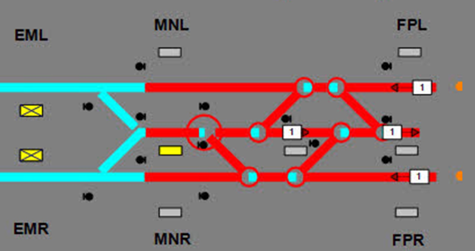
View of the failure that occurred March 3, 2020, from the TMC control center. Disturbed track switches are circled and disturbed track segments shown in red.
To do this successfully, Muni’s technicians need to have a solid familiarity for what behaviors and indications are “normal”—not an easy task in a system that has some of its original equipment dating back to the 1990s, mixed with other parts that have been swapped and re-swapped as the years go on. Last week, it was night-shift technician’s sharp eye that caught a split-second oddity on the Axle Counter Evaluator, or ACE, a computer that monitors those train detectors in the trackway.
The Signal Maintenance crew found that the ACE was in an unusual low-power mode. After swapping out the power supply and bringing the computer to full power, it still wouldn’t boot. After changing some components it started up, but now one of two redundant control computers, called Intersigs, failed whenever both were switched on together, but each worked fine individually.
On Thursday morning they thought they found the culprit—a faulty connector that had been working faithfully since the 90s, allowing only one of the two Intersig computers to run at a time. But just as the crew was packing up their tools after replacing the faulty connector, both of the Intersigs failed again.
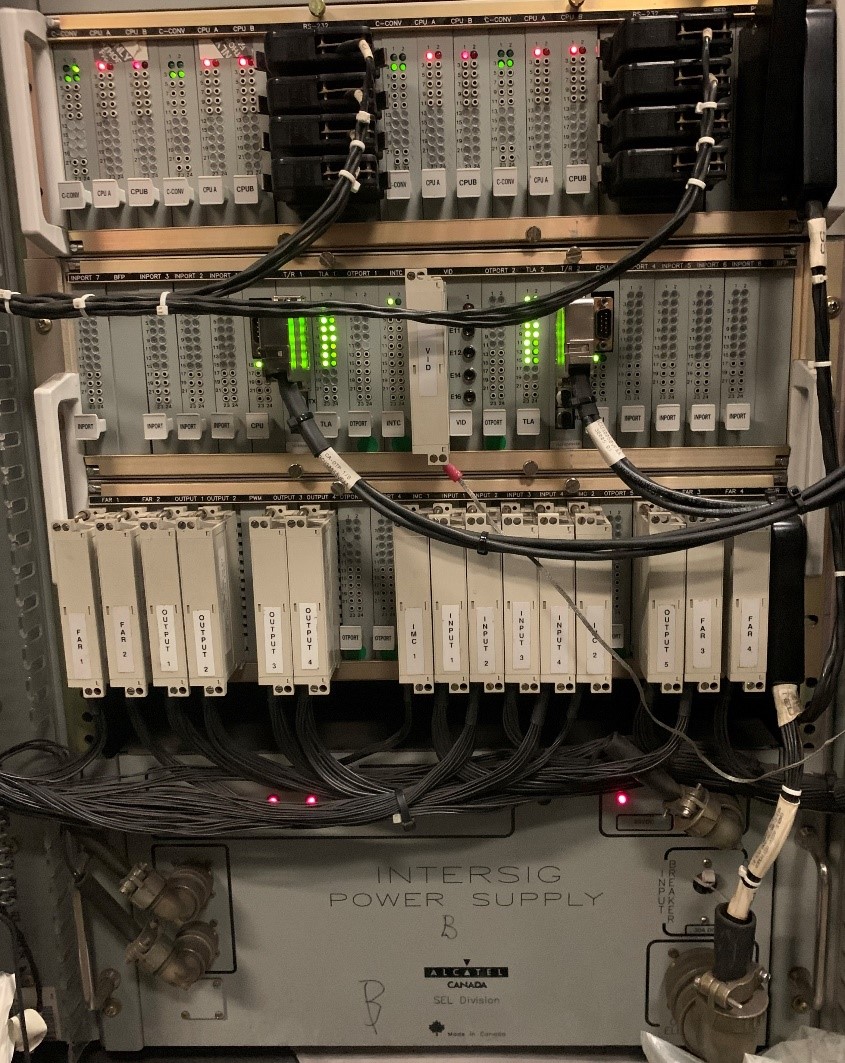
The local control center rack at the MMT, containing the Intersig computers
They restarted troubleshooting when a member of the crew noticed something unusual for a split-second while watching the flashing lights of the equipment. Although the two Intersigs failed, the ACE, the original piece of equipment that was having problems, had also failed very briefly, but recovered itself without declaring an error. Because it recovered so quickly and showed no indications or logs that it had failed, it had gone unnoticed.
To address the new ACE failure, the team increased the power supply and there were no more failures. The night shift team had finally found the root cause of the problem: The faulty power supply had damaged multiple pieces of equipment in the area, causing them to fail in different ways.
Without so many things going right—the sharp eye of the night crew, the dedicated systems knowledge of the technicians, the collaboration and turnover of information between work shifts and the willingness to stick to the methodology, it’s likely that this problem wouldn’t have been discovered so quickly.
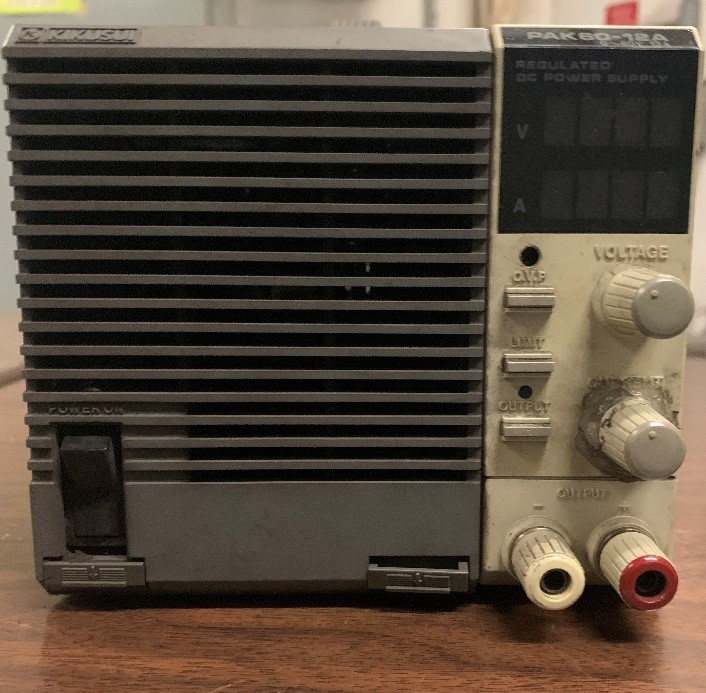
The culprit of the March 3 subway train control system failure, an old power supply
Our train control system is a challenge to manage because it is both a technology system and a piece of critical infrastructure. In the United States, this sort of infrastructure is updated once or twice a century, but technology systems become obsolete at a much faster pace.
Like every other transit system in the country, Muni has been managing the train control system on the same timescale as infrastructure. That has left us with situations like this when components become outdated and ultimately fail.
Today, with a subway train control system approaching 30 years old, our success depends entirely on the prowess and dedication of our maintenance team, who are holding the system together. While we celebrate their capabilities to get us through events like this, we must rely on more than just the heroics of our staff to provide more reliable train service for San Francisco.
We must change the paradigm of how we procure, manage and maintain our train control systems. Muni’s rail network demands a modern train control system which is always kept up to date with the latest service-proven technology, and our customers deserve it.
Published March 16, 2021 at 02:26AM
https://ift.tt/3qRCzcu
Monday, March 15, 2021
Show HN: Create your own cellular automata https://ift.tt/3qPotZo
Show HN: A cross-browser extension for GitHub's URL shortener (git.io) https://ift.tt/3cyAzkr
Show HN: Booker, Python script for making pocket sized saddle bound books https://ift.tt/2PUlWAb
Show HN: Create your own codecademy-style lessons https://ift.tt/3cupSiY
Show HN: CorridorChat lets employees network through random 1:1 video chats https://ift.tt/3qKRGVb
Show HN: ShaderRoy - Shadertoy in Rust https://ift.tt/3rNX3Eu
Show HN: Using Genetic Algorithm to Create Fractals https://ift.tt/38B44kf
Show HN: Reddit Hyped Stocks – A web app to explore hyped stocks on Reddit https://ift.tt/3rHv2OR
Sunday, March 14, 2021
Show HN: Critter.Camera – Browser based motion detection and image capture https://ift.tt/38BTxpb
Show HN: Monitor your el-cheapo UPS via SNMP https://ift.tt/3qLaPGC
Show HN: Ephemeral-SSH – A container-based solution for newer SSH version(s) https://ift.tt/30EVWv1
Show HN: Relocation for Self-Employed https://ift.tt/3cxVaoS
Show HN: Formula 1 Statistics Database https://ift.tt/3eBPzRd
Show HN: Bookmark Knocking – Hidden Bookmarks Without a Browser Extension https://ift.tt/30HnsIc
Show HN: MoneyGame – In-Browser Business Simulation Game https://ift.tt/3vf6qz4
Show HN: Live Man Switch https://ift.tt/2NlWq6c
Show HN: Ensō-write and think now, edit later https://ift.tt/3cvn8BI
Show HN: Submona – A lightweight webfont version of Mona (Shift JIS art font) https://ift.tt/38xWk2r
Show HN: ReallyConfused – Explore, create and share self-learning tech roadmaps https://ift.tt/3vk8xle
Saturday, March 13, 2021
Show HN: Preql – a database query language that compiles to SQL https://ift.tt/3co1246
Show HN: Authenticator by 2Stable – The missing Authenticator app https://ift.tt/38Bw6MA
Show HN: I developed a native Cocoa Hacker News client https://ift.tt/30CSAsr
Show HN: A Terminal Tetris Game https://ift.tt/3ld0ge7
Show HN: Flat Habits – iOS habit-tracking for minimalists and org mode fans https://ift.tt/3rHVjMR
Show HN: Neonpad.io – A neon plain text editor https://ift.tt/3ewR8zV
Show HN: Interactive Org Chart for Engineers https://ift.tt/3vcSh5s
Show HN: Legacy Mac Proxy https://ift.tt/3ctQzEn
Friday, March 12, 2021
Show HN: Open-source Shell and SSH terminal with end-to-end encryption https://ift.tt/3cqt5jp
Show HN: I made a site so that you could get paid through simple messaging https://ift.tt/3vrkrtR
Show HN: Upload and use large files hosted on Discord on your website https://ift.tt/3qJY2Ee
Show HN: Code 3D World – Interactive, and batteries included 3D coding platform https://ift.tt/3qFEIrK
Show HN: Open-Source Hacker News Redesign (React) https://ift.tt/3tcCqlz
Show HN: Futuure – hash-certified public prediction store https://ift.tt/30DF3R6
New Routes to School for In-person Instruction
By Kate McCarthy
As SFUSD considers a return to in-person instruction, many families are adapting how they will travel to school and work and SFMTA is proud to provide a strong set of mobility options to help facilitate school trips. Bicycling, scooting, skateboarding and walking to school have never been more accessible in San Francisco.
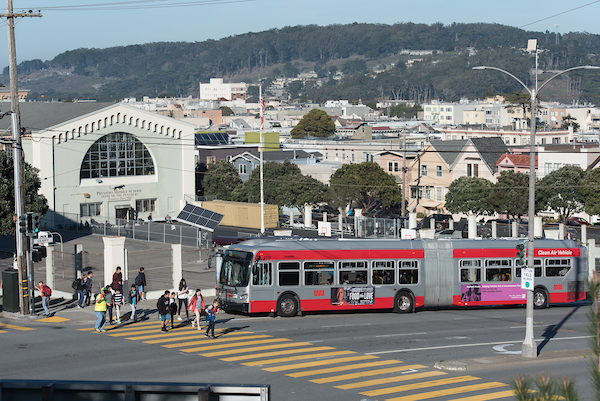
Presidio Middle School
Nearly 30 Slow Streets introduced during the shelter-in-place limit through traffic on certain residential streets with signage and barricades. Slow Streets has significantly expanded the network of low-stress routes families can more safely use to get to schools by walking or bicycling. The SFMTA’s Safe Routes to School team is here to help students get to school safely and sustainably, with resources and trainings on how to walk or bike to school and use the city’s new Slow Streets.
As San Francisco emerges from the pandemic, planning for schools to reopen has been at the forefront of the SFMTA’s Transportation Recovery Plan, our framework for expanding our services and operations as public health orders are modified and demand for travel increases. In 2020, a team led by SFMTA traffic operations engineer Andre Wright evaluated drop-off and pick-up needs at 114 San Francisco Unified School District schools. SFMTA staff are available to assist schools in expanding access to transportation options and safe drop-off planning with our smallest San Francisco residents in mind.
While we’ve had to make tough choices about Muni service during the pandemic, we have strategically invested in key school routes like the 29 Sunset and 44 O’Shaughnessy and have developed a core network of very frequent service along our major corridors. As school demand kicks-in, the SFMTA may also reintroduce “school trippers,” the supplemental Muni routes that begin after school hours to serve middle and high schools throughout the city, if needed.
This higher frequency along our core network and extra service on major school routes is complemented by the fact that over 90% of San Franciscans are within a quarter mile of Muni, with even more coverage expected by the time school starts in fall.
To help families take the guesswork out of planning trips, the SFMTA is developing a new Multimodal Transportation map of San Francisco that will launch later this spring. The map combines walking, bicycling and Muni options for getting around. For example, if the Muni route the family used before the pandemic is not in service, they may see an alternate route, or that there’s a slow street or a bike lane in their neighborhood that they may feel comfortable using to get to school. The Multimodal Transportation map aims to help families navigate travel options and choose the modes that work best for them.
In addition to our work to make sure Muni is ready for back to school, we are proud to be offering our Free Muni for Youth program that provides free Muni to low-income youth ages 5 to 18 living in households making less than the Bay Area Median Income. To help cover Muni fare for students, SFMTA recently partnered with SFUSD to identify 25,000 additional students who would qualify for the Free Muni for Youth program based on their Free/Reduced lunch registration. Letters are being sent to these families that will act as applications that can be signed and returned to sign-up, and an online application will also be available. Anyone who has qualified for the program and received their card is enrolled until they are 19 years old and does not need to reapply.
While taking Muni continues to be a low-risk activity for COVID-19 transmission, the health of Muni customers is a top priority and we are taking extra precautions to limit exposure. Muni car cleaners and station custodians are cleaning and sanitizing vehicles and high-touch surfaces daily with safe, strong disinfectants. We are seeing over 95% mask compliance and families riding Muni to school as the pandemic persists can help by wearing a mask on board and when waiting for Muni.
Whether your family finds a new route to school on two wheels, six wheels, by walking or by rail, we think you’ll find transportation has recovered from the pandemic healthier than it was before. No matter how your family chooses to get to school as in-person instruction reopens, SFMTA is committed to helping you get there.
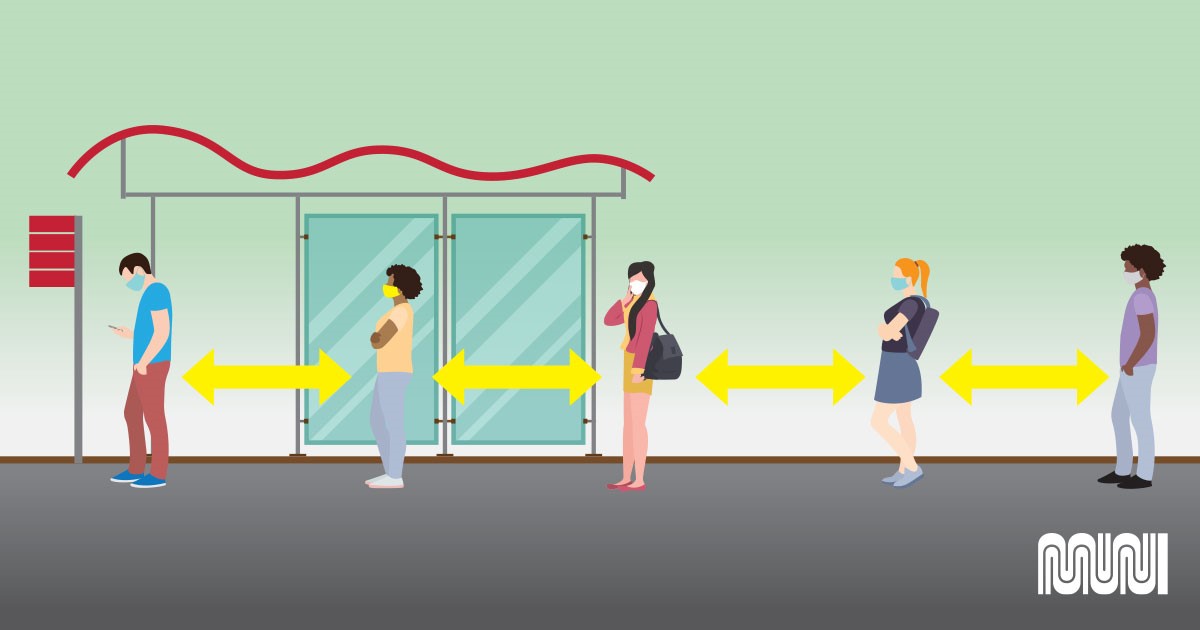
Graphic showing physical distancing at Muni stops
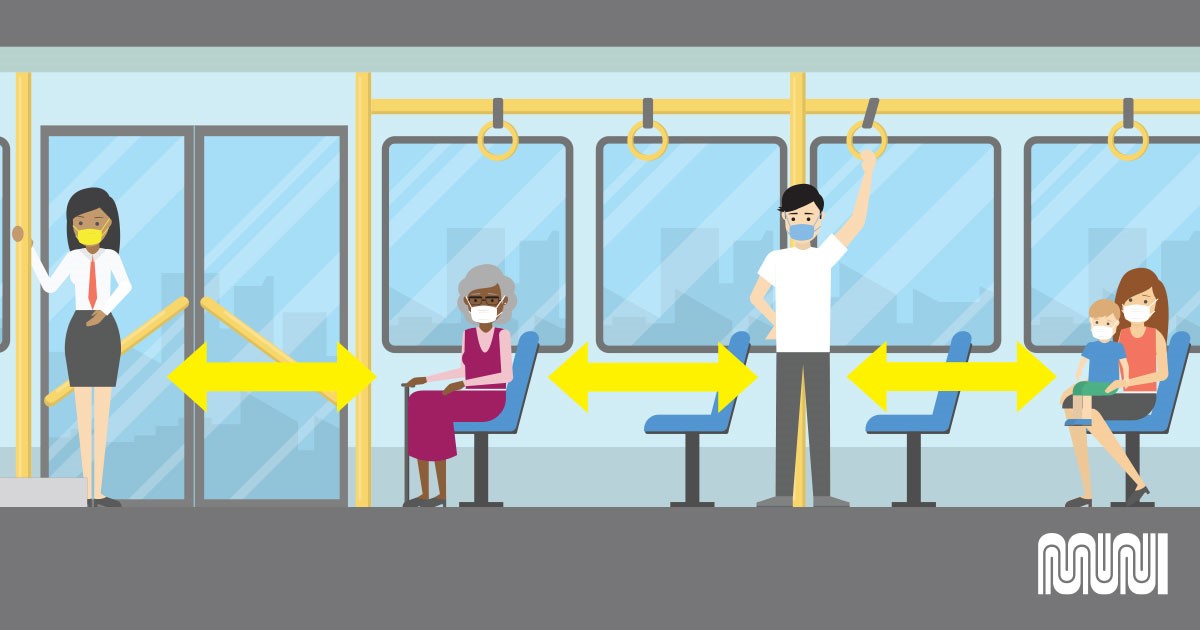
Example of physical distancing on Muni buses: Wear a mask or face covering and give space for fellow riders.
Published March 12, 2021 at 06:05AM
https://ift.tt/3ezXwGv
Show HN: A place to buy a business idea / To sell your 200 unused domains https://ift.tt/3qFCrN8
Show HN: Search over 100M archived posts and comments scraped from Parler https://ift.tt/3viYE7e
Show HN: The HK19 manual – A crowdsourced protest guide https://ift.tt/3cfWtso
Show HN: Efemarai – Visualizing and debugging ML models https://ift.tt/3eusOhT
Thursday, March 11, 2021
Show HN: UX/UI design for a flat monthly fee https://ift.tt/38xLVEd
Show HN: Make Your Photo 16x9 https://ift.tt/2PPWPhX
Show HN: Vax.Codes – Open-source Covid-19 vaccine verification QR codes https://ift.tt/3rEVs3E
Show HN: Ballreport – Key basketball data in one place https://ift.tt/3l5Gz81
Show HN: Generate 3D device mockups in a quick and engaging way https://ift.tt/3vgzy95
Show HN: No/Low code in-app onboarding guides for SaaS businesses https://ift.tt/3bA5eyB
Show HN: Soapbox – drop-in audio for casual conversation with strangers https://ift.tt/3rH0jBG
Wednesday, March 10, 2021
Show HN: Enterprise-grade security simplified for developers https://ift.tt/3qyG7jX
Show HN: Saffire – Controller to override image sources https://ift.tt/30v5UPl
Show HN: A Graphical User Interface (GUI) for Google App Engine https://ift.tt/30vpStu
Show HN: Catalist – save movie, TV show, book, and podcast recommendations https://ift.tt/3v9h2iS
Show HN: Let's encourage ad blocking (2016) https://ift.tt/3bwv9Hx
Show HN: Singlelink – an open-source micro-site platform https://ift.tt/3ckGEAG
Show HN: We released Docusaurus internationalization: translate your docs easily https://ift.tt/2OGDnU8
Show HN: I made a tool to convert images of tables to CSV https://ift.tt/3ckyx7c
Show HN: I made a non censor social platform, no account needed for posting https://ift.tt/3bvW8D2
Show HN: A note taking application that encrypts in the browser (2015) https://ift.tt/3l0vyEZ
Tuesday, March 9, 2021
Show HN: Cast AI has built a service to cut AWS cloud bill 50% to 90% https://ift.tt/2N0WmbH
Show HN: Diahook – Webhooks as a Service https://ift.tt/3rJ3clv
Show HN: High Definition YouTube GIF Maker https://ift.tt/38og4pq
Show HN: M3O – A cloud platform for API development https://ift.tt/3qBlPXa
Show HN: Stack Underflow – stackoverflow clone made using MERN and GraphQL https://ift.tt/3ehkB0C
Show HN: Narrated – Personal Screen Recordings https://ift.tt/30sPhUC
Show HN: TimetoHerd – Days left until 70% of your country is Covid-19 vaccinated https://ift.tt/3brpgLB
Show HN: Compare routes generated by Google,Apple,MapQuest,Mapbox,etc https://ift.tt/3buG6cq
Show HN: Chrome Extension to Auto-Group AWS Tabs by Region https://ift.tt/3rvusU7
Show HN: Caint.casa, a simple hosted comment system https://ift.tt/2PCJyJu
Show HN: RpCheckup – Catch AWS resource policy backdoors like Endgame https://ift.tt/3v8OQww
Show HN: Farmhand – an open source, multiplayer farming game PWA https://ift.tt/3t5vA1p
Show HN: Pyrustic – To build and publish desktop applications https://ift.tt/3qvPzEy
Monday, March 8, 2021
Show HN: Zeneca, the Successor to Goodreads https://ift.tt/3c7gmC4
Show HN: FAANG.io – Engineering jobs from FAANG in one spot https://ift.tt/3brGfxt
Show HN: OpsDrill Incident Response Escape Room https://ift.tt/2O4HkT3
Show HN: Glassmorphism UI https://ift.tt/3ekHFve
Show HN: Droppin – see which friends are available to hang out IRL https://ift.tt/3tcQtI7
Show HN: COMPOST – A DWeb-native magazine about the digital commons https://ift.tt/30nkQPv
Show HN: Git for LLMs – a context management interface https://ift.tt/ph0M2wd
Show HN: Git for LLMs – a context management interface Hi HN, we’re Jamie and Matti, co-founders of Twigg. During our master’s we continuall...
-
Show HN: An AI logo generator that can also generate SVG logos Hey everyone, I've spent the past 2 weeks building an AI logo generator, ...
-
Breaking #FoxNews Alert : Number of dead rises after devastating tornadoes, Kentucky governor announces — R Karthickeyan (@RKarthickeyan1)...
-
Show HN: Snap Scope – Visualize Lens Focal Length Distribution from EXIF Data https://ift.tt/yrqHZtDShow HN: Snap Scope – Visualize Lens Focal Length Distribution from EXIF Data Hey HN, I built this tool because I wanted to understand which...
